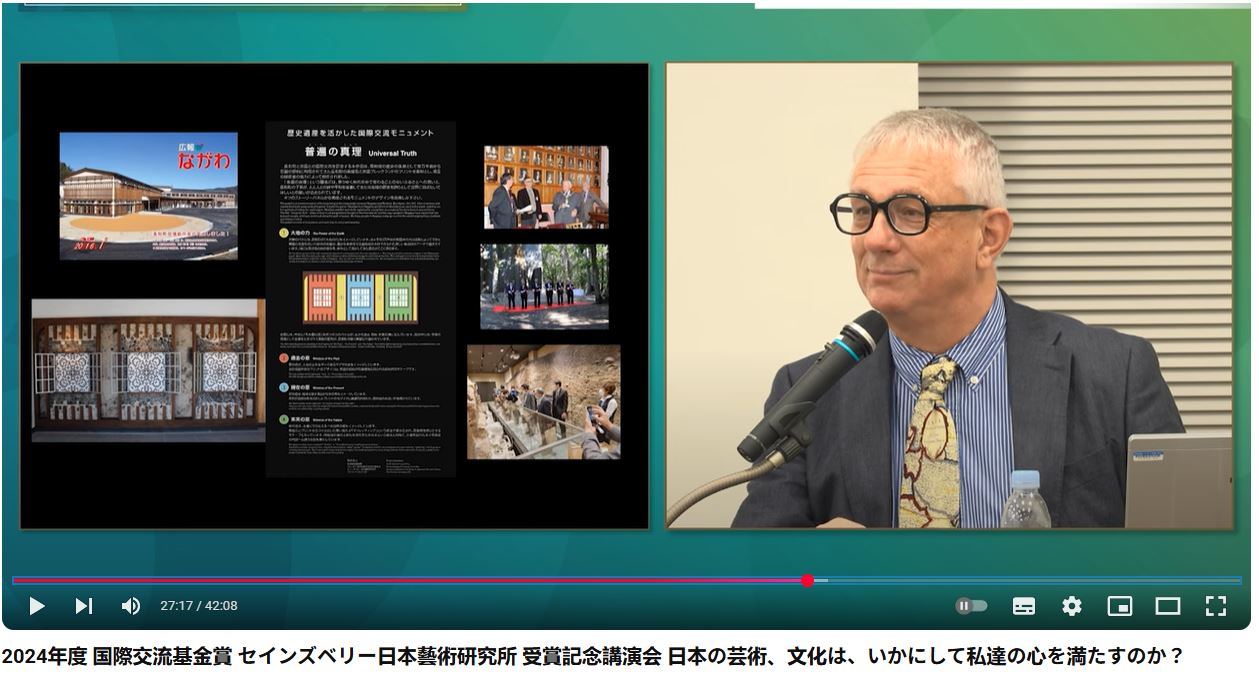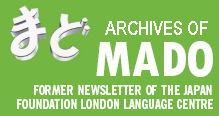News
Click to view news stories from these sections
19/01/2026
On Tuesday 4 November, we held our second talk in our ‘Exploring the World of Japanese Studies’ series at the University of East Anglia.
The wide spread of specialisation amongst the staff at UEA allowed us to truly showcase the diversity of research at this institution. To align with the research interests of the academics and to commemorate the 80th year since the end of World War Two, the theme of this talk was ‘War and Peace: How ‘Grave of the Fireflies’ Speaks to Japanese Literature, Art, History, and International Relations.
The talk featured contributions from:
Dr Eriko Tomizawa-Kay (Director of the Centre for Japanese Studies and Associate Professor in Japanese Art History), who showed selected artworks from the wartime period and afterwards, and reflecting of the depiction of the war.
Dr Hannah Osborne (Lecturer in Japanese Literature), who provided background and insight into the Grave of the Fireflies from a literary perspective.
Dr Ra Mason (Sasakawa Associate Professor), who examined the impact of the war and the relationship with peace, via the lens of the occupation of Okinawa
Dr Nadine Willems (Associate Professor in Japanese History), who spoke to us about the impact of the war on civilians and children
and Dr Sherzod Muminov (Associate Professor in Japanese History), who discussed themes and motifs in Grave of the Fireflies that were repeated and could be found in other works relating to children who were impacted by the war.
Each speaker used ‘Grave of the Fireflies’ effectively, as a starting point to introduce the audience to their unique insights and research, delivering a 10 minute focused presentation.
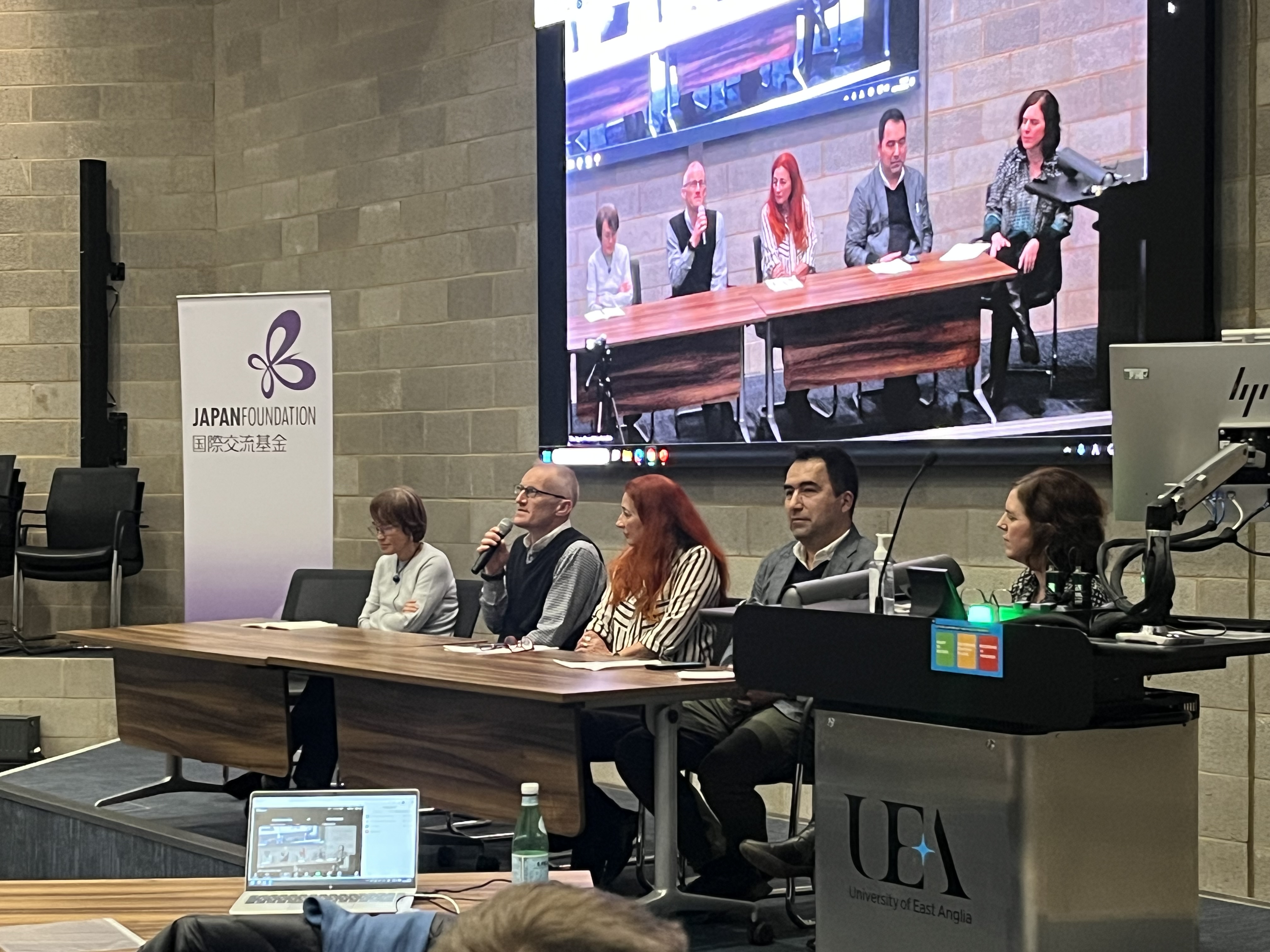
We then held a roundtable session with interesting and thought provoking questions from the audience, ending with a question for the speakers to recommend specific works of literature (fiction or non-fiction) relating to the end of world war two and Japan.
Finally, Dr Akiko Tomatsuri (Associate Professor in Japanese Language and Translation) gave us an overview of the importance of learning Japanese Language in assisting in Japanese research, and provided details of the Japanese Language department at UEA.
We hope this talk continued to provide inspiration for those interested in Japan and Japanese Studies!
12/08/2025
The Japan Foundation London was proud to work with UCL for the 11th year of the UCL-Japan Youth Challenge!
This is a prestigious week-long summer school, bringing together high school students from schools around Japan and pre-university students from the UK for a week of lectures, tours, and cultural exchange. It is a great opportunity for young people to get a taste of university life in the UK, while making new friends and practicing their communication skills in a multicultural environment.
We were pleased to see a high number of students from the UK attending this year, showing the interest that young people have in attending a programme that promotes interaction between Japan and the UK.
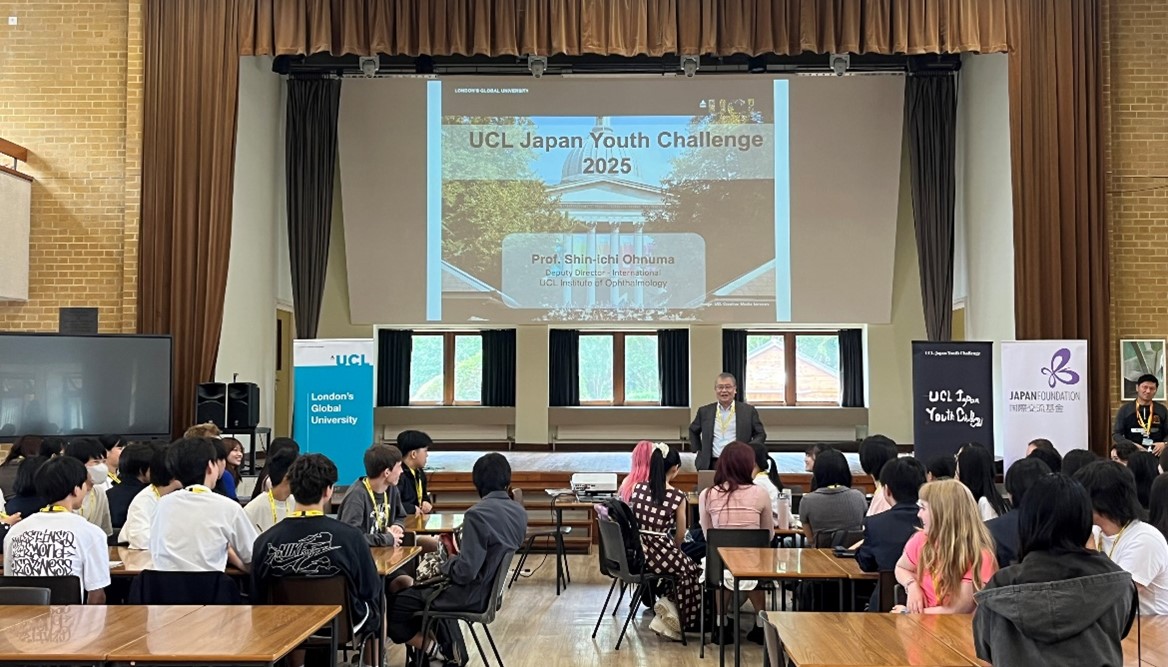
The welcome day was held at the Rikkyo School in Surrey. This was an opportunity for the students to present and introduce themselves! The Japanese students introduced their schools, home towns, hobbies, and personal interests. Next, the UK participants welcomed the Japanese participants and introduced themselves one by one.
In the afternoon, the students participated in ice breaking sports activities. Then, they enjoyed a barbecue together on a sunny evening!
On Sunday, the students visited Cambridge for a day of sight-seeing, punting, and a formal dinner in the beautiful dining hall at Corpus Christi College.
The following day, they began their lectures at the University of Cambridge! Over the course of the day, they heard eight lectures on different topics, from neurobiology to robotics as well as physiology, from professors and doctors at the university.
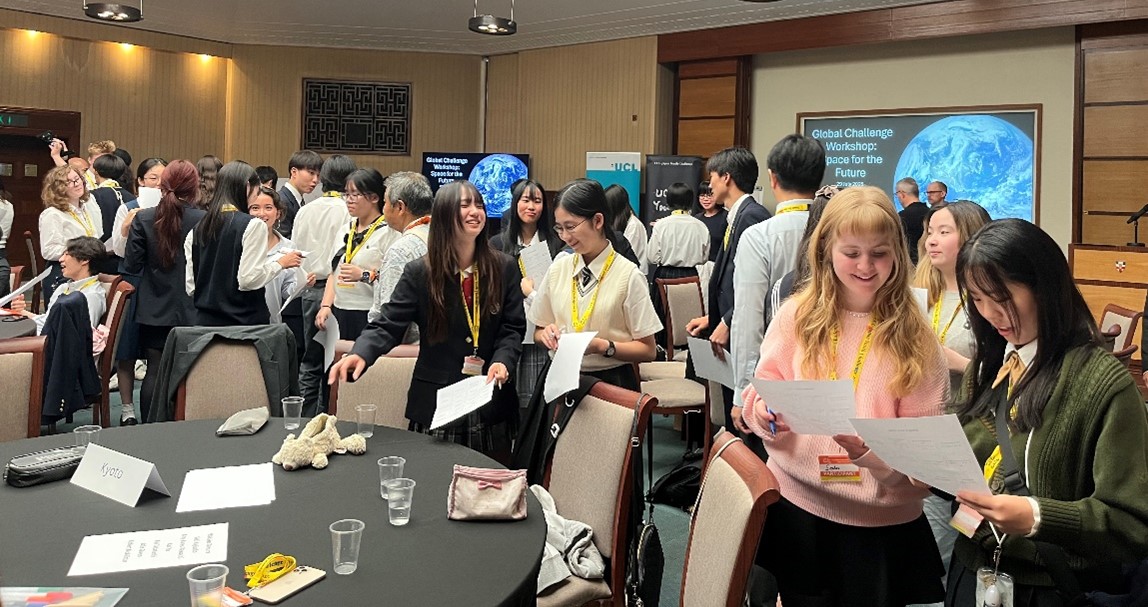
On Tuesday they travelled to UCL to participate in the Grand Challenge Workshop! The theme for this year’s workshop was ‘Space and Us’, asking students to consider potential solutions to global issues. They began by defining their agreement to work well with one another, before discussing some pre reading that they had been set on topics such as personalized medicines, life expectancy, high emission rates, the climate crisis and space exploration. The students discussed the social, political, economic, technological, legal and environmental implications of the news items.
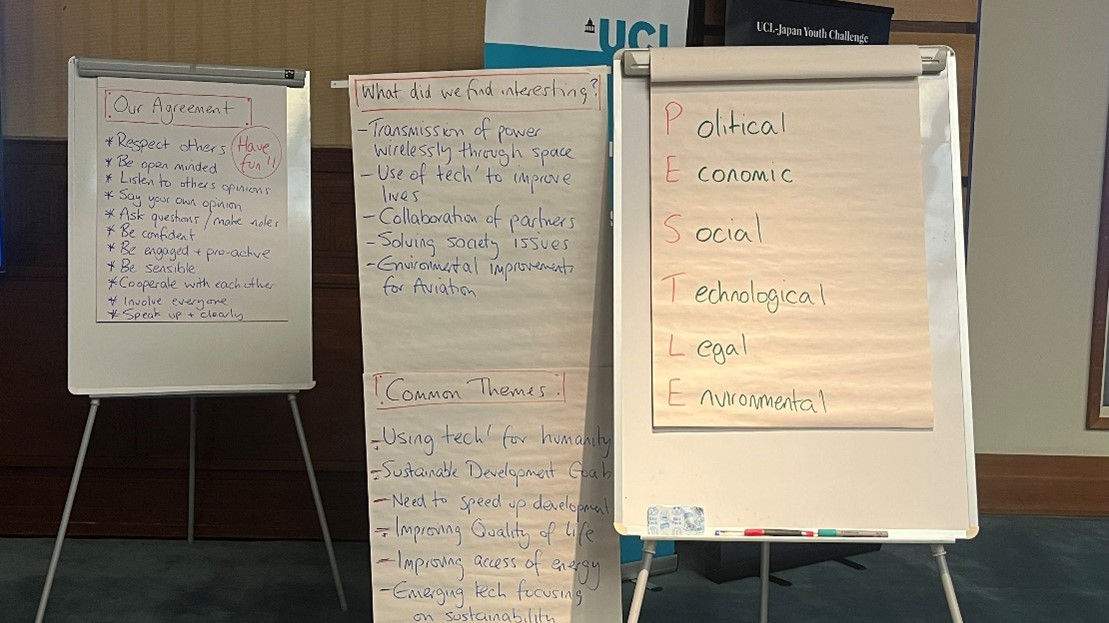
They were then split into their presentation groups for the symposium, and worked together to identify their key issues, the support that was available, and potential solutions. The students shared all of their ideas in English, ensuring to involve each individual in the discussions, and they left the workshop well equipped with ideas to prepare for their presentations in the symposium.
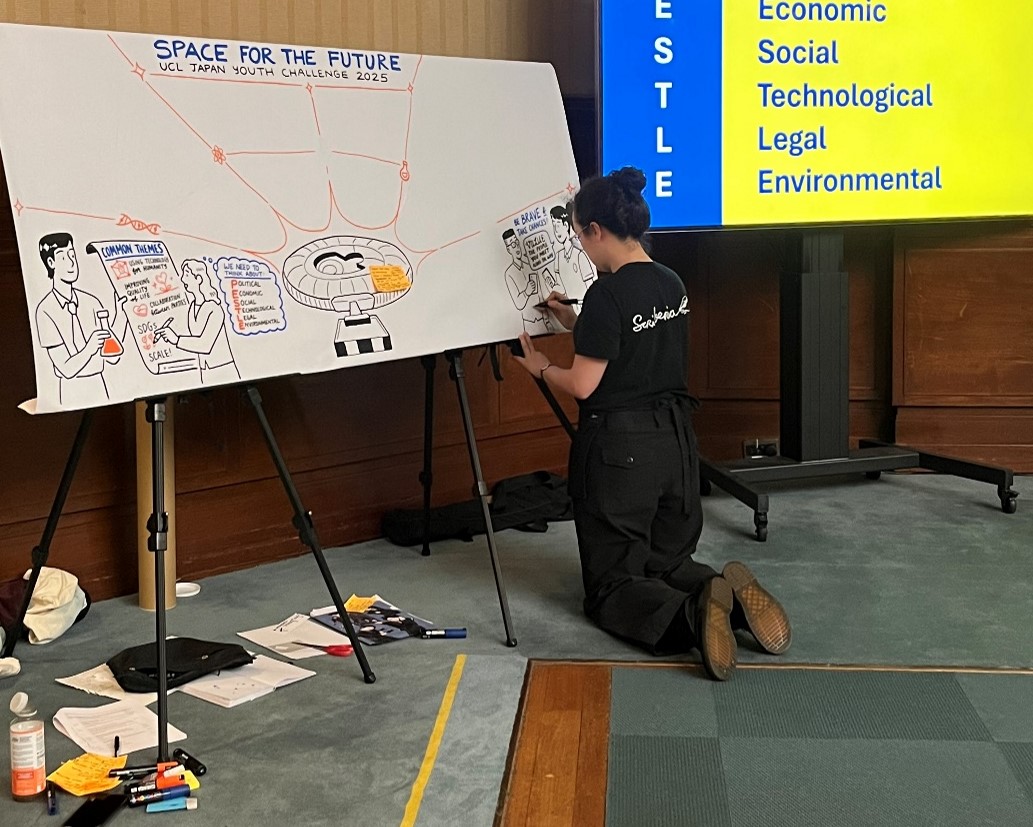
As in previous years, a representative from Scriberia provided live sketches of what the students discussed in the workshop
On Wednesday, the participants visited the Harwell Science and Innovation Campus in Didcot, Oxford. They spent the day learning about the work that Harwell are undertaking in Energy, Space, Health and Quantum Computing, and listened to talks about the Diamond Light Source research, Oxford Space Systems, and Space Clusters.
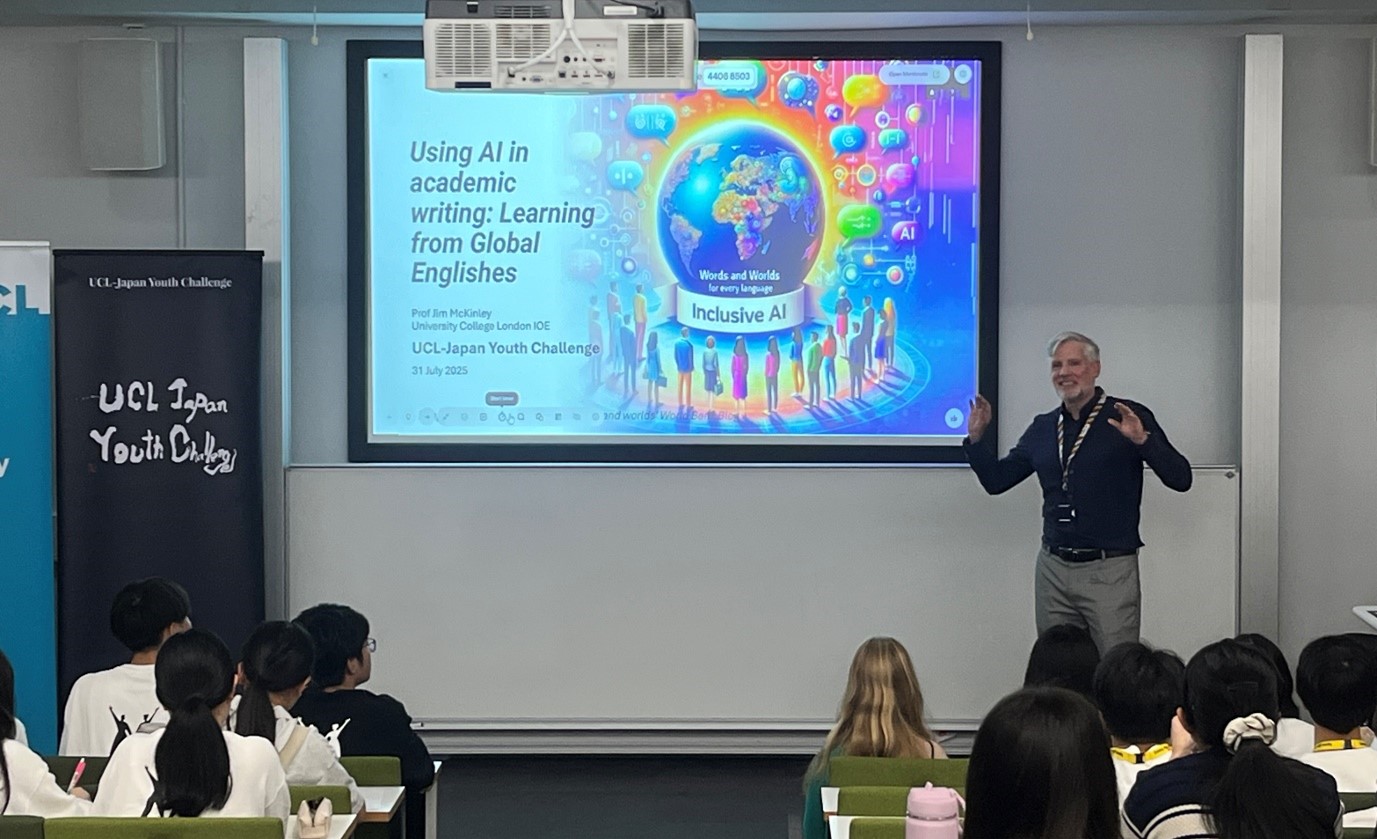
On Thursday, it was a return to UCL for a full day of interesting talks and lectures, including from representatives from the Embassy of Japan in the UK and the Japan Society for the Promotion of Sciences London. They also heard introductions to UCL and Tohoku University and admissions, and lectures in the fields of linguistics, nanotechnology, and civil engineering.
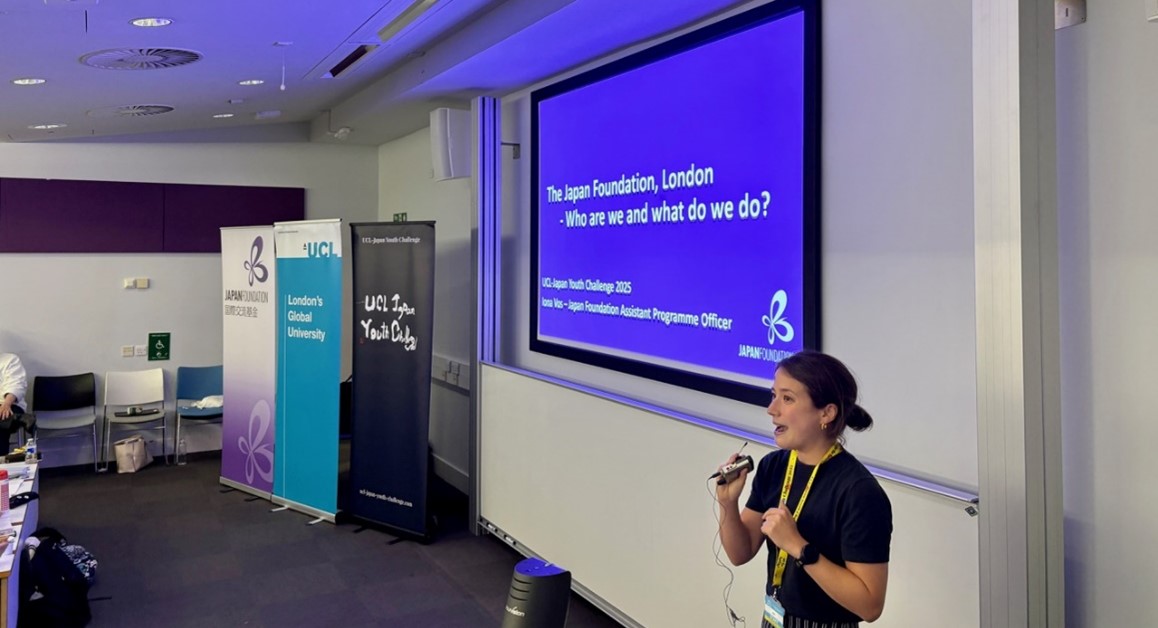
The Japan Foundation London also informed the students of their events and grant programmes, giving the students a little insight into what it is like to work for a cross cultural organization.
Friday was the day of the symposium. In the morning, the students received a tour of the UCL campus, before practicing their presentations.
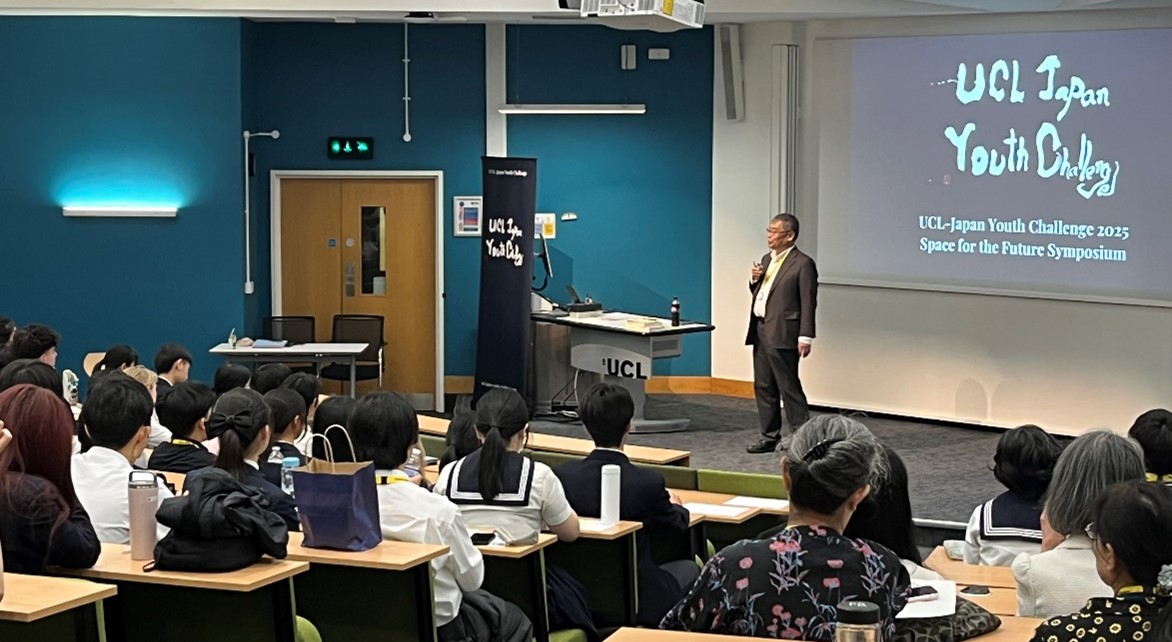
Then the symposium began. Prof Shin-ichi Ohnuma from UCL introduced everyone to the UCL-Japan relationship, the summer school programme, and thanked the sponsors for their support for the event.
During the symposium, Mr Yutaro Tanaka from Mitsubishi Electric spoke about their SLIM project to create machinery to carry out research on the moon, as well as ways in which Mitsubishi have supported space exploration. Dr Mikako Matsuura from Cardiff University talked about the exciting research that can be conducted using a space telescope. Ms Keshini Navaratnam, an international affairs and media expert, spoke about the changing modern landscape and the relationship between media and international law.
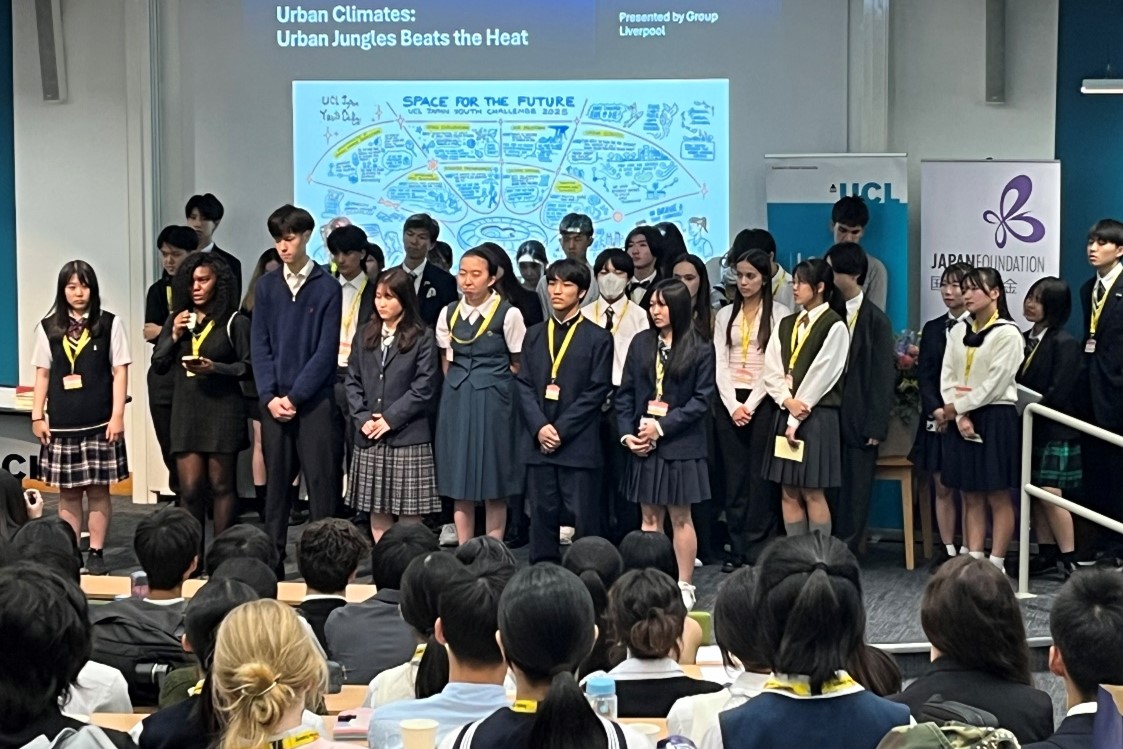
The student presentations were next! The participants had been instructed to create 3 minute presentations on the topics they had explored during the Grand Challenge Workshop earlier on in the week. The topics included preservation of cultural heritage sites, preparation for natural disaster, urban climates and biodiversity in smallholder farming. Each presentation was followed by a question from the audience. We were struck once again by how well carefully considered all the ideas in the presentations were, and the power of communication.
In the latter half of the symposium, Prof Andrew Coates from UCL informed us of UCL’s contribution to investigating life on Mars, and the Rover that UCL was helping to build. Prof Masahiro Yamaguchi from Tohoku University detailed the impact of Quantum Physics on the universe. Finally, Mr George Cann from Foster & Partners spoke about his work on designing permanent structures to be built on the moon.
The symposium ended with Japanese high school students giving the speakers gifts from their home towns, and a huge round of applause from the audience for all of the hard work that the students had carried out this week!
We then had a reception, where students from Fukushima prefecture spoke in English about the impact of the 3.11 triple disaster on their home towns. The students highlighted that issues that might seem local can actually be relevant on a global scale. This reflected the importance of continued cross-cultural communication, to keep sharing information about issues around the world.
Congratulations to the participants of the UCL-Japan Youth Challenge!
We would like to commend the organisers of the UCL-Japan Youth Challenge from UCL and Japan at UK for another successful programme. We would also like to thank the supporters and sponsors of the event, and we hope to continue to work together in the future on events that promote intercultural exchange and mutual understanding.
Click here to visit the official programme website.
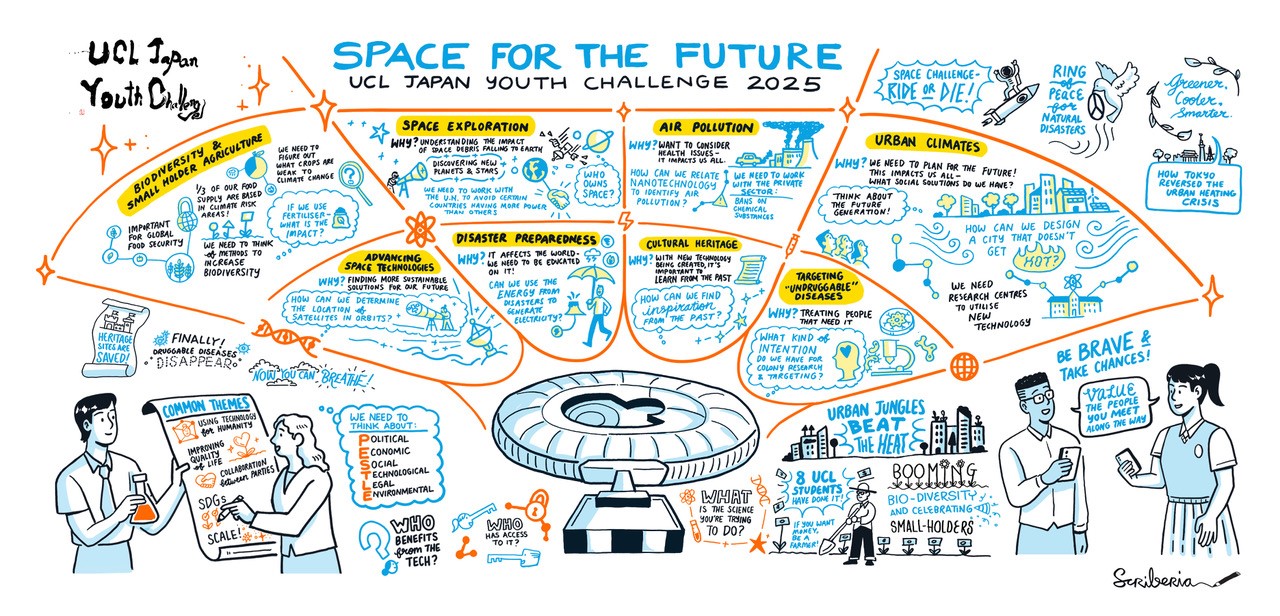
©Scriberia, 2025. UCL-Japan Youth Challenge Illustration
17/07/2025
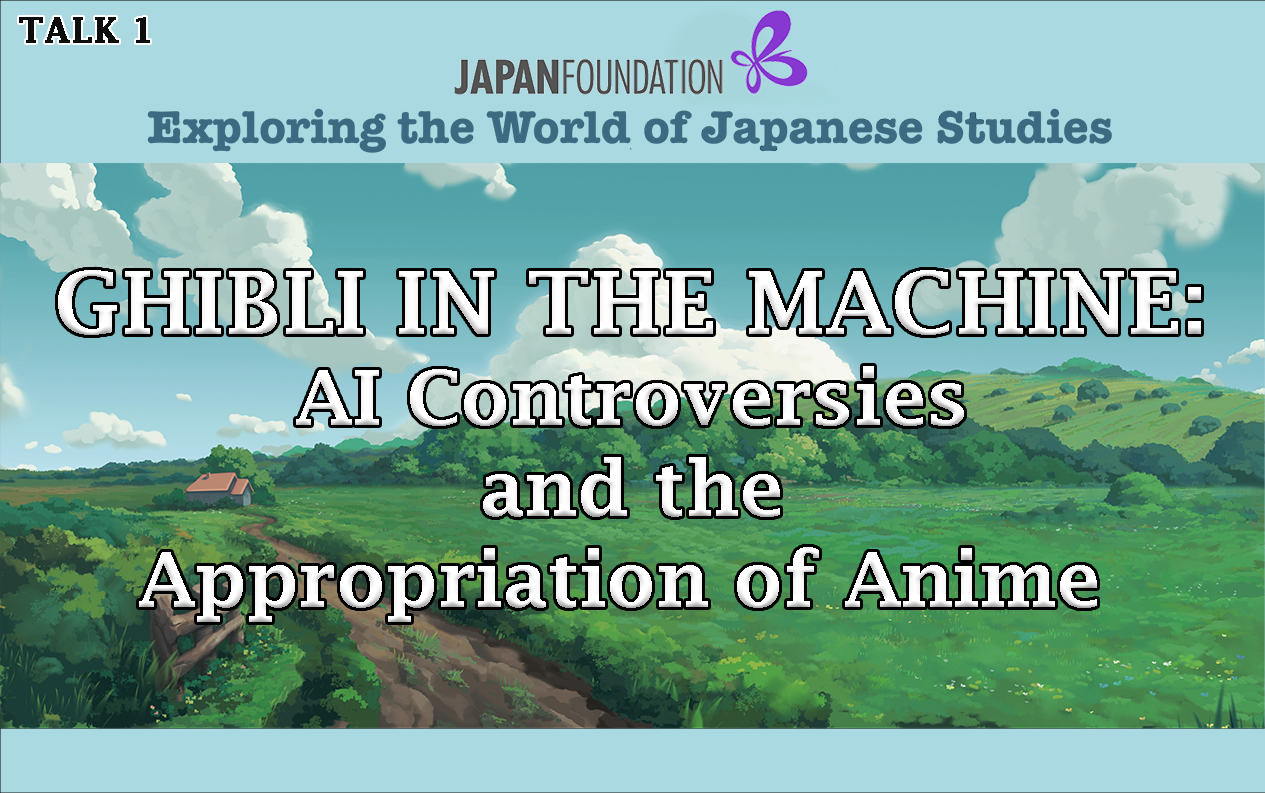
On Friday 4 July, The Japan Foundation London hosted a seminar at Lancaster University, as part of our new series, Exploring the World of Japanese Studies.
This new series aims to display the breadth and diversity within Japanese Studies, to inspire and motivate future researchers as well as to shine a light on the to the research being conducted at various universities around the UK to the general public!
We took the opportunity when partnering with Lancaster University’s Anime symposium that took place earlier on the 4th July (read the event report about that symposium here) to host a separate lecture that same evening.
This event was the first in our new seminar series, and was titled Ghibli in the Machine: AI Controversies and the Appropriation of Anime, with Dr Zoe Crombie (Associate Lecturer in Film Studies at the Lancaster Institute for the Contemporary Arts, Lancaster University) and Prof Rayna Denison (Professor of Film and Digital Arts and the University of Bristol).
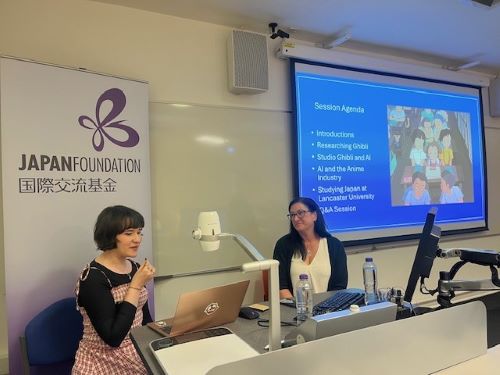
The event was a hybrid event, and the general public were encouraged to attend, as well as university and sixth form students with an interest in Japanese Studies.
We were joined by a sizable online and in-person audience, with a total of approximately 60-70 audience members!
Dr Crombie started the seminar by providing the background on the topic, giving the audience an in depth history of Studio Ghibli before contextualising the topic by exploring AI and its wider use in society, before looking at its recent impact on the animation studio when a recent AI filter that transformed existing images into “Ghibli”-fied versions. Dr Crombie questioned how successful the filter was, as well as the potential repercussions for the animation studio. She also brought up the ethical, cultural, aesthetic and economic implications of using Artificial Intelligence tools, and how appropriation can end up misrepresenting the original creator’s intentions.
Prof. Denison then provided examples of AI “trailers” for films, and further questioned the legality of using original material. It was a fascinating exploration of the use of AI and potential future use of AI by production companies, and the impact this could have on workers. She considered that AI is not considered as a solely negative thing, being used already in the industry, and that it has some positive attributes that are worth bearing in mind. However, we were left to consider what the future holds for Anime, and what the human and environmental cost of Artificial Intelligence might be.
Dr Crombie then gave an introduction to what Japanese research looks like at an institution like Lancaster University, that does not have a dedicated Japanese degree programme, but still attracts and employs academics and researchers who have an interest in Japan.
We ended with a Q&A session that invited many questions from the audience, both in-person and online. Questions ranged from copyright issues, the distribution and selling of AI materials, the ethical and material difference between human-created work and AI-created work. It was an incredibly interesting discussion that provided much food for thought, and is a topic that we were left to consider long after the lecture finished.
We would like to sincerely thank Dr Zoe Crombie and Prof Rayna Denison for their cooperation and hard work in creating and delivering the seminar.
We would also like to thank Dr Zoe Crombie a second time for her hard work in helping us host the seminar, and Lancaster University for all of their cooperation.
We will be hosting another lecture in the Exploring the World of Japanese Studies Seminar Series later on in the year, so keep your eye out on our website and social media pages for updates!
We look forward to seeing you at a future event!
17/07/2025
Journal of Anime and Manga Studies Publication
*The proceedings of the following symposium have now been published on the Journal of Anime and Manga Studies*. This is freely available to the public and available online!
Access the journal here: Vol. 6 No. 1 (2025): Proceedings from Transnational Perspectives on Anime: A Symposium | The Journal of Anime and Manga Studies
Event Report
We were proud to partner with Lancaster University on this one day symposium, “Transnational Perspectives on Anime” that took place on Friday 4 July.
This symposium brought together experts in their field, academics and students, to discuss and contemplate Anime and its impact around the world and on different aspects of society.
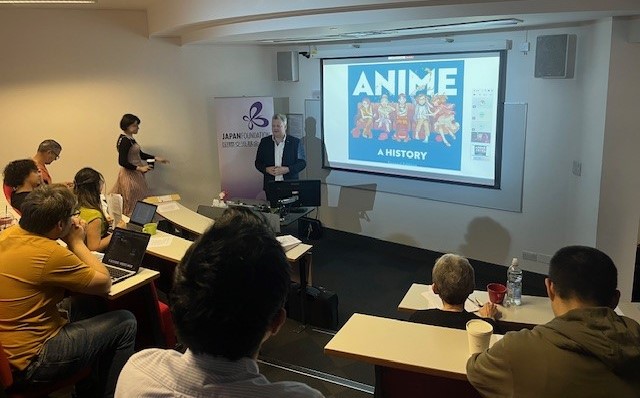
The day started with a keynote speech from Dr Jonathan Clements who gave us an insight into the history of animation in China and its fluctuating relationship with anime, not only in terms of the audience market but also its impact in production, the politics of distribution, and the impact of the government on the animation industry.
This led us neatly into the first panel, ‘Anime, Nation and Race’. Zizhou Zhang (PhD candidate, University of East Anglia) delved into ‘Donghua’, or Chinese animation, and how the Chinese animation industry has started to develop its own culturally distinct identity. Khushboo Bansal (PhD candidate, University of Delhi) spoke about the role of Indian broadcast censorship in shaping Anime Narratives for Domestic Viewers. Cerise Jackson (PhD candidate, University of Oxford)’s talk on New Frameworks for ‘Black Anime’ and Beyond considered the depictions of black people in anime and what constitutes ‘Black Anime’, as well as the clear need for further research on the topic.
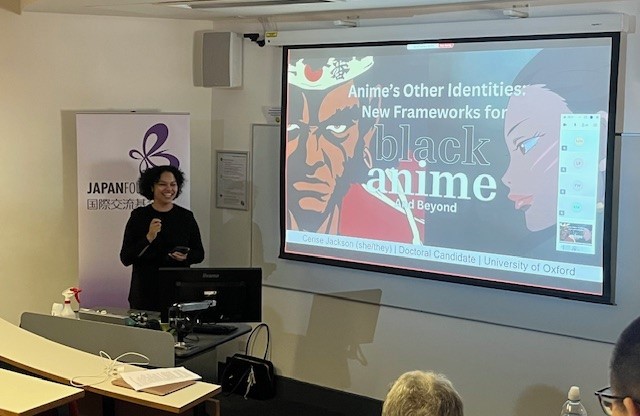
After a short break for tea and coffee, we entered the second panel of the day, New Approaches to the Transnational Anime Text.
Helen McCarthy (independent researcher) raised the dilemma of an ageing generation in Japan, and the impact that this might have on anime in terms of its popularity and the target market, whether this might mean that the target market shifts or new countries arise as leaders in the genre. Dr Dorothy Finan (University of Leeds) discussed Virtual YouTubers (VTubers) and hololive, and the phenomenon of fan relationships with animated characters with agency. Dr Simone Shu-Yeng Chung (Université Grenoble Alpes) brought an architectural viewpoint to the discussion, by showing us how animators portray space to enable viewers to ‘feel’ motion and movement.
We then paused for lunch, before returning for Prof Rayna Denison (University of Bristol)'s keynote talk, 'The Transnational History in Anime' which considered the impact on anime of historical events such as the Meiji restoration and the move from isolation to transnationalism.
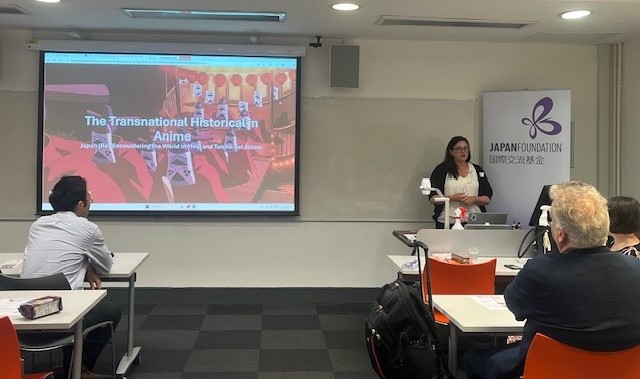
Panel 3, Ghibli (and Pre-Ghibli) Transnational Interactions began with Dr Manuel Hernández-Pérez (University of Salford) who examined the spread and influence of Heidi, girl of the Alps (1974) in Francoist Spain, and how it laid the foundations for the perception of animation as a legitimate cultural product. Nick Anderson (PhD candidate, Eastman School of Music) discussed the European songs used in Porco Rosso and The Wind Rises and how crossing borders musically can produce cinematic hauntologies. Dr Shiro Yoshioka (Newcastle University) delved into the transition from ‘Anime’ to ‘Ghibli/Miyazaki Anime’, and the conscious move away from ‘anime’ by Studio Ghibli in the pursuit of commercial and critical success.
The final part of the day, Panel 4, Adapting History and Culture, began with Prof. Livia Monnet (University of Montreal) who demonstrated that Yuasa Masaaki’s animated film Inu-Oh (2021) and how it reenvisions animation and performance as subversies philosophies. Antonio Rivera Arnaldos (PhD candidate, Universidad Carlos III de Madrid)’s talk analysed Gisaku (2005) as an exercise in cultural diplomacy and transnational media adaptation, appropriating anime to visualise Spain’s historical and cultural identity. Maria Chiara Oltolini (Universita Cattolica) ended the panel by examining the Japanese anime adaptation of The Swiss Family Robinson , entitled Family Robinson castaway story: Flone of the mysterious island (1981). Maria considered how the series engaged with and revised different narrative archetypes, as well as paying attention to representations of female and male characteristics in the anime.
Each panel was followed by an enthusiastic Q&A session where the attendees asked interesting and thoughtful questions to each speaker. The day was full of interesting discussion about the transnational nature of anime, with participants from around the world discussing the impact of anime on different cultures and countries. It was very interesting to reflect on the history of anime, as well as what the future of the genre might look like as it continues to evolve, take on new definitions and innovations!
The Japan Foundation London is grateful to have attended and partnered with Lancaster University on this event which was a true representation of how exciting and varied research on Japan can be, and aligned with the Japan Foundation’s mission to encourage intercultural exchange.
We would like to thank Lancaster University, especially the organiser of this event Dr Zoe Crombie, for their hard work in carrying out this one-day symposium.
12/06/2025
Professor Simon Kaner, (Executive Director of the Sainsbury Institute for the Study of Japanese Arts and Cultures)'s talk, 'How Japanese Arts and Cultures Make Us Happier' is now available to watch on YouTube!
On Friday 18 October, 2024, The Japan Foundation Awards 2024 Commemorative Event was held in Tokyo, to celebrate the recipients of the award.
SISJAC was one of these recipients, for their ongoing hard work in promoting Japanese culture and their achievements in the area of Japanese Studies and International Dialogue.
During the ceremony, SISJAC's Executive Director, Professor Simon Kaner delivered an exciting and inspirational talk, 'How Japanese Arts and Cultures Make Us Happier'. The talk covered SISJAC's widespread and ground-breaking work in bridging the gap between Japan and the UK. Prof. Kaner also explored the wider concept of happiness and wellbeing, and how arts and culture can bring together communities.
Prof. Kaner was invited to deliver his talk at a special event organised by the Japan Foundation London, hosted at Japan House London on Thursday 16 January, which was also livestreamed online to a huge audience. You can read our news report about this event here.
If you missed it, Prof. Kaner's talk at the official ceremony in Tokyo has now been uploaded to the Japan Foundation YouTube channel!
To watch the video, click this link:
https://www.youtube.com/watch?v=1BRAWSTLl_E
We would like to offer our congratulations once more to our friends at the Sainsbury Institute for the Study of Japanese Arts and Cultures!
To find out more about the Japan Foundation Awards, click here.
13/03/2025
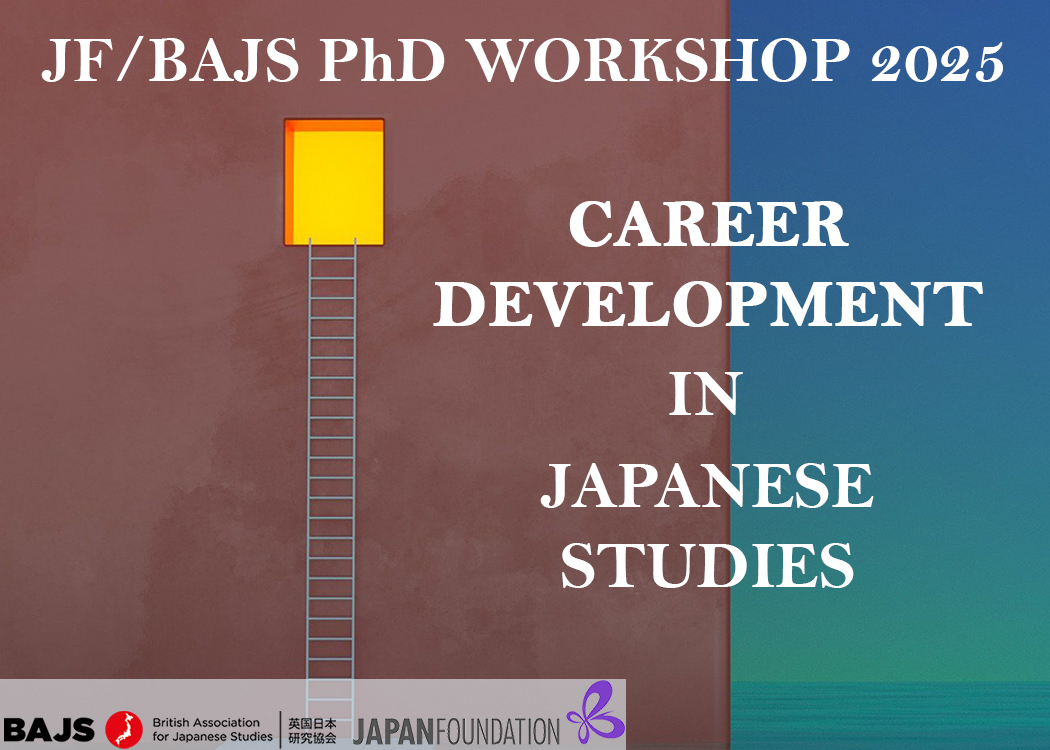
On Friday 21st February we welcomed 37 postgraduate students to The University of Edinburgh, for our annual Japan Foundation/British Association for Japanese Studies (JF-BAJS) PhD Workshop.
It was a windy and rainy morning in the Scottish capital, but this did not dampen everyone’s spirits as they arrived with smiling faces and excitement for the day ahead!
We were joined on the day by 7 academics who moderated the morning sessions and appeared on the panel: Dr Abigail MacBain, Dr Chris Perkins, Dr Helen Parker, Dr Holly Stephens, Dr Ferran de Vargas, from The University of Edinburgh, Dr Christopher Hayes from Teesside University, and Prof Peter Kornicki, President of BAJS.
Once everyone had registered and helped themselves to tea, coffee and shortbread, the day began.
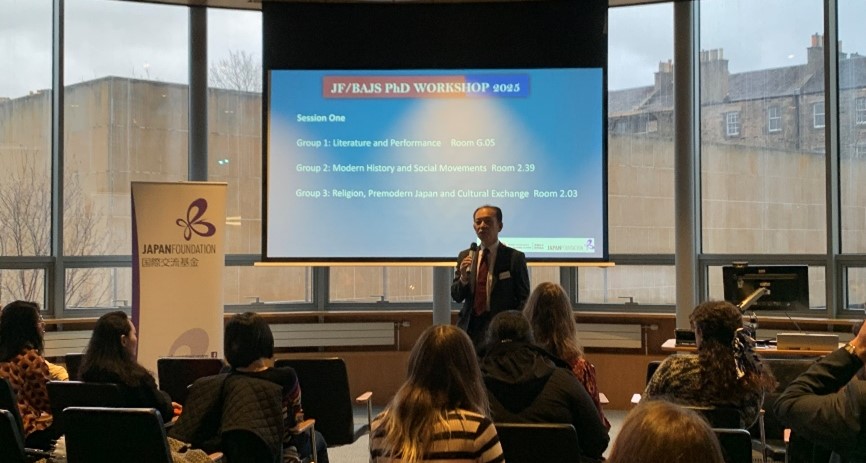
First, we listened to three welcome talks by Mr Shin-ichi Tanaka, Director of the Japan Foundation London; Professor Peter Kornicki, Emeritus Professor of Japanese Studies at the University of Cambridge; and Dr Chris Perkins, Senior Lecturer in Japanese at the University of Edinburgh.
They emphasised the importance of making the most of opportunities of events such as the PhD Workshop, as a means of networking with other peers and academics from around the UK. The speakers motivated the students for a productive one-day event, with Dr Perkins outlining the format of the morning sessions and encouraging the attendees to participate as much as possible.
After the welcome talks, the students split into their three presentation groups for the morning session. The groups were designated categories, based on the attendees and their research topics, as well as the academics assigned as moderators to each group. This year, the group categories were: Literature and Performance; Modern History and Social Movements; and Religion, Premodern Japan and Cultural Exchange.
The research topics displayed the diversity and interests in current Japan-centred research. Topics ranged from Buddhist rituals, to Yokai and cultural memory in anime, Japanese-Thai interethnic families’ educational strategies, sexual consent projects by Tokyo grassroots organisations, Japanese disaster narratives, and Noh drama and masculinity. This is just an extremely small handful of examples of the truly wide-ranging and interesting research topics that were presented and discussed.
The student participants presented their research, and then answered questions from their peers and group moderators. Each discussion group was full of interesting questions. Not only were the presenters asked about their research but it was a true knowledge exchange, with frequent suggestions of useful quotations, relevant scholars to look into, or different concepts to explore.
The presenters were all in varying stages of their research, from prospective PhD students to 1st years, to those in the very final stages of their dissertations. Each student’s opinion was respected and taken into consideration. It was clear how much the students were enjoying hearing each other’s research by the enthusiastic thrum of noise that was audible during the tea and coffee break halfway through the morning.
After the final presentations of the morning the students had a well-earned lunch break, where they continued to mingle, network, and discuss their research and ideas with one another over a catered buffet, after which we entered the next session.
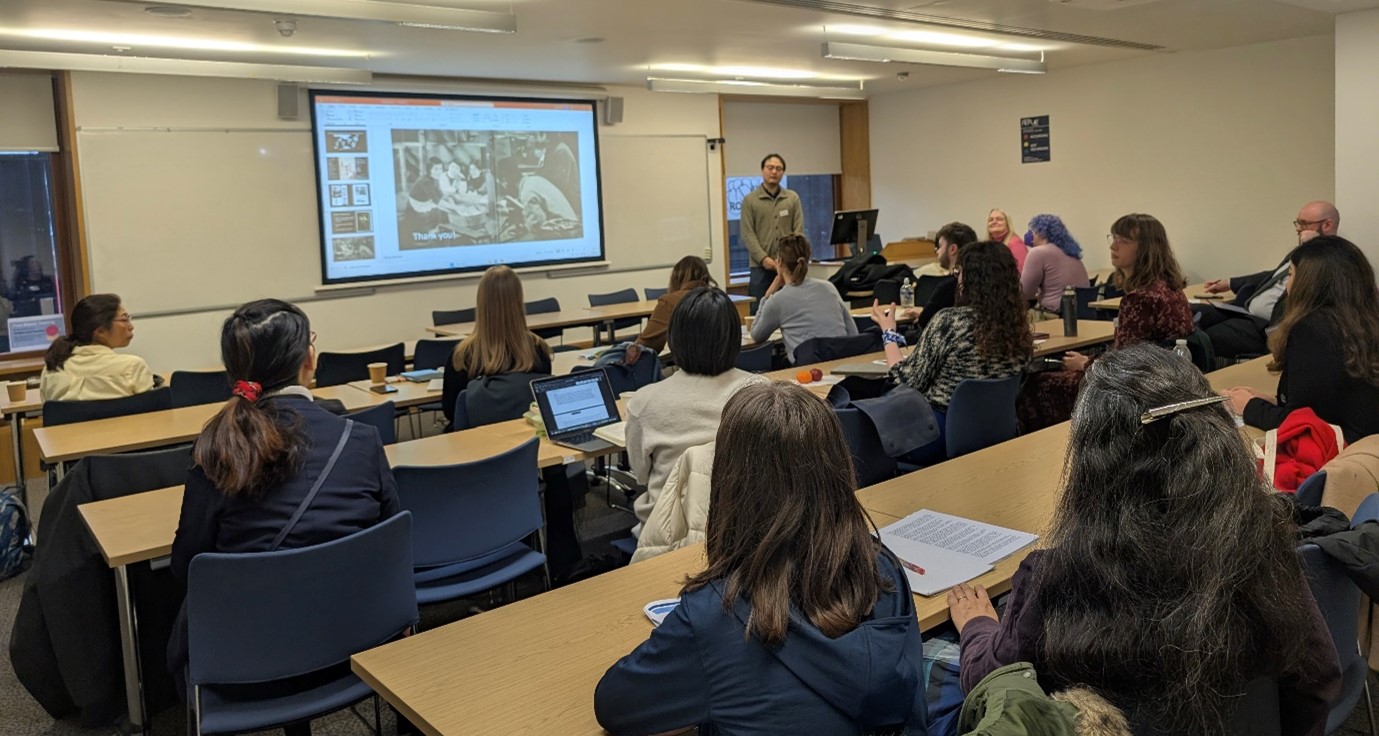
During Session Two, multiple funding institutions were invited to present to the students. The Great Britain Sasakawa Foundation, Japan Society for the Promotion of Science, Daiwa Anglo-Japanese Foundation, the Japan Foundation and British Association for Japanese Studies gave presentations on the funding, support, and activities that they offer. Attendees received information about what funding opportunities are available to them directly and in the wider field of Japan-related research and events.
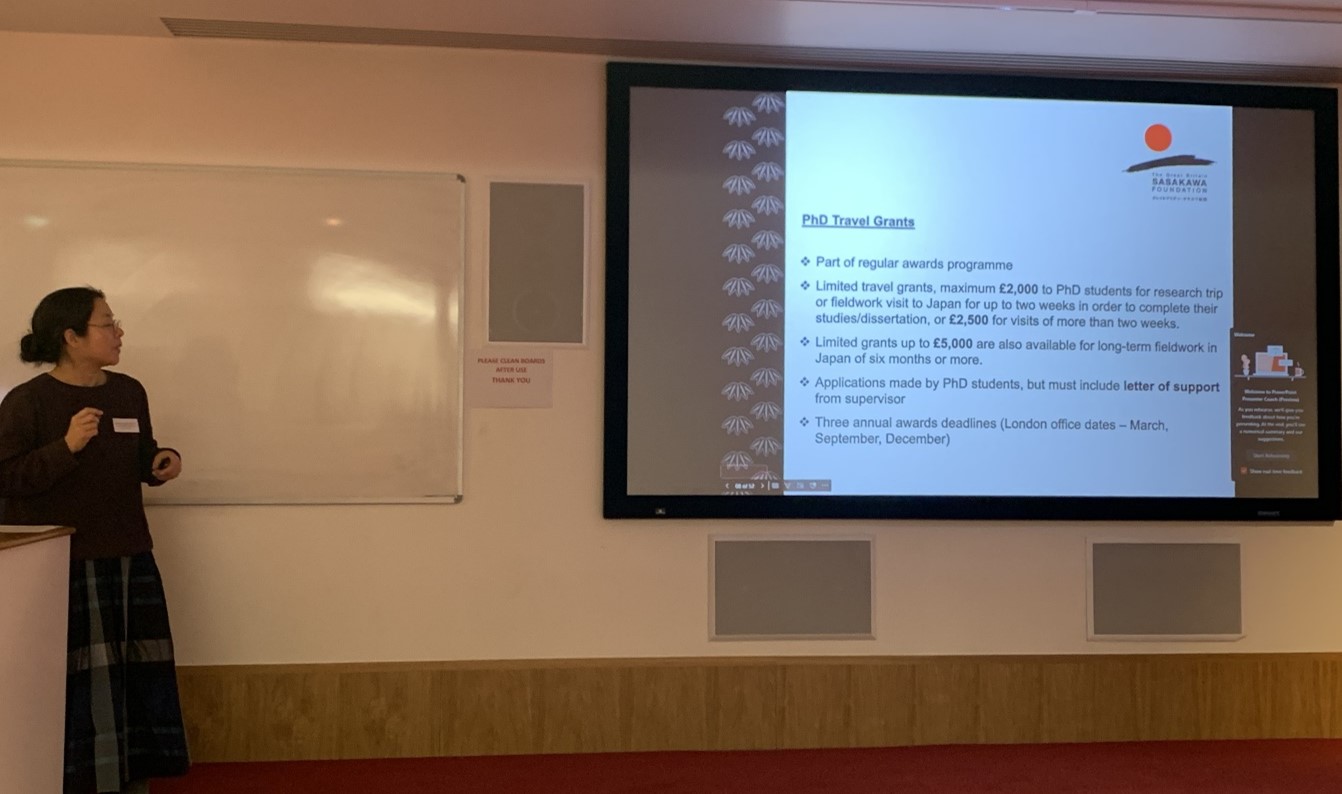
Next, we entered Session Three. Professor Peter Kornicki reflected on his career in Japanese Studies, to provide students with insights based on this year’s theme of Career Development. His talk was engaging and entertaining, taking the students on a journey through his career from the UK to Japan, to working in Tasmania and back. Prof Kornicki highlighting the importance of flexibility, risk-taking, timing, luck and finally having a Plan B during a career in academia. His talk emphasised how progression is rarely a straight line. He also provided more practical advice, describing support that was available for academics, and the important things to bear in mind when applying for a job or for funding.
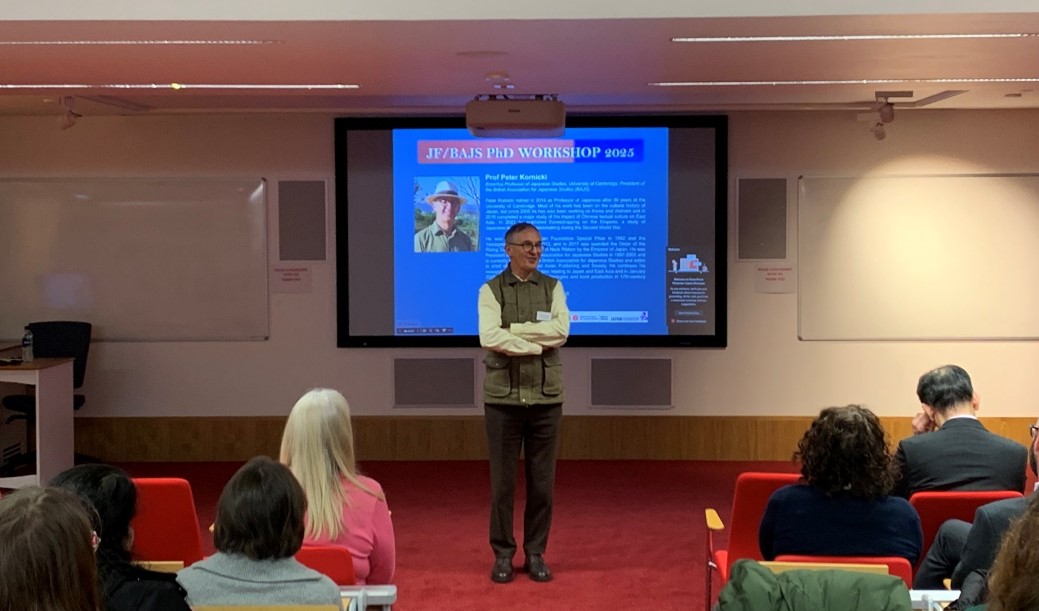
There was a tea and coffee break in the afternoon after Prof Kornicki’s talk, which gave the students fuel for the final session of the day.
Session Four was a panel Q&A session with the six academics who had led the morning sessions:
Dr Helen Parker (moderator), Lecturer in Japanese at the University of Edinburgh
Dr Ferran de Vargas, UKRI Marie Skiodowska-Curie Postdoctoral Fellow at the University of Edinburgh
Dr Christopher Hayes, Senior Lecturer in Tourism & Events Management at Teesside University International Business School
Dr Abigail MacBain, Lecturer in Premodern Japanese Studies at the University of Edinburgh
Dr Chris Perkins, Senior Lecturer in Japanese at the University of Edinburgh
Dr Holly Stephens, Lecturer in Japanese and Korean Studies at the University of Edinburgh
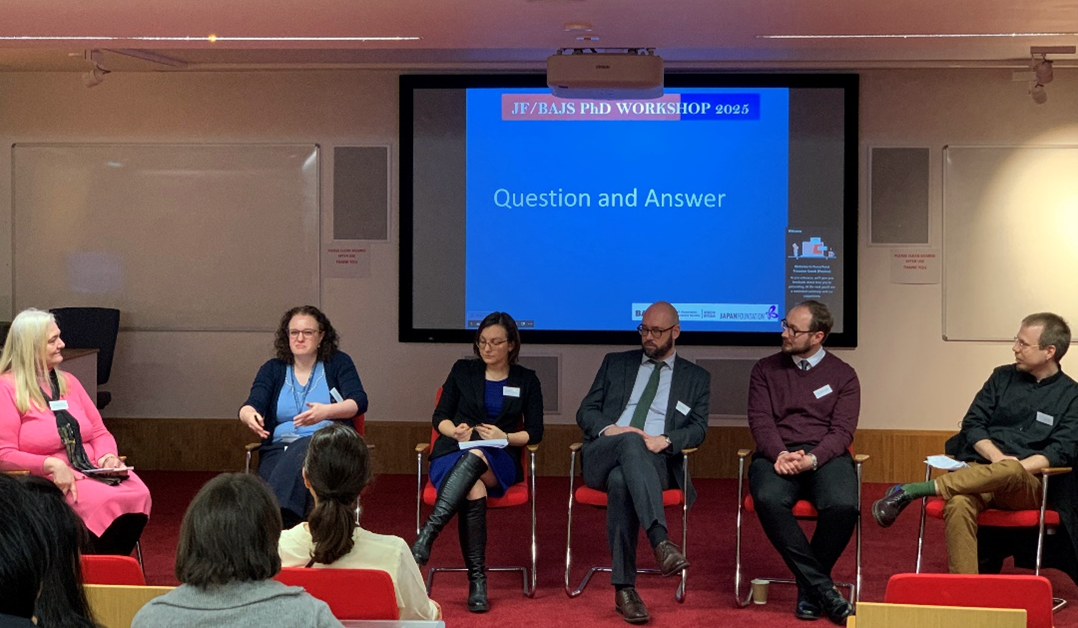
The academics began by briefly introducing themselves, before diving straight in to a difficult question on how to deal with career lulls and breaks, and the ebbs and flows of an academic career. Each academic had unique experiences in their careers so far, which they shared candidly with the students. The Q&A session ranged from questions about balancing career and personal life, how to keep mental health in check and the importance of selfcare, to more practical topics such as the necessity for maintaining a good Japanese language level, and writing job applications. The academics emphasised that there are multiple ways to develop a career in academia, and that Japan-related specialism is a unique selling point that can help to stand out in a crowded field.
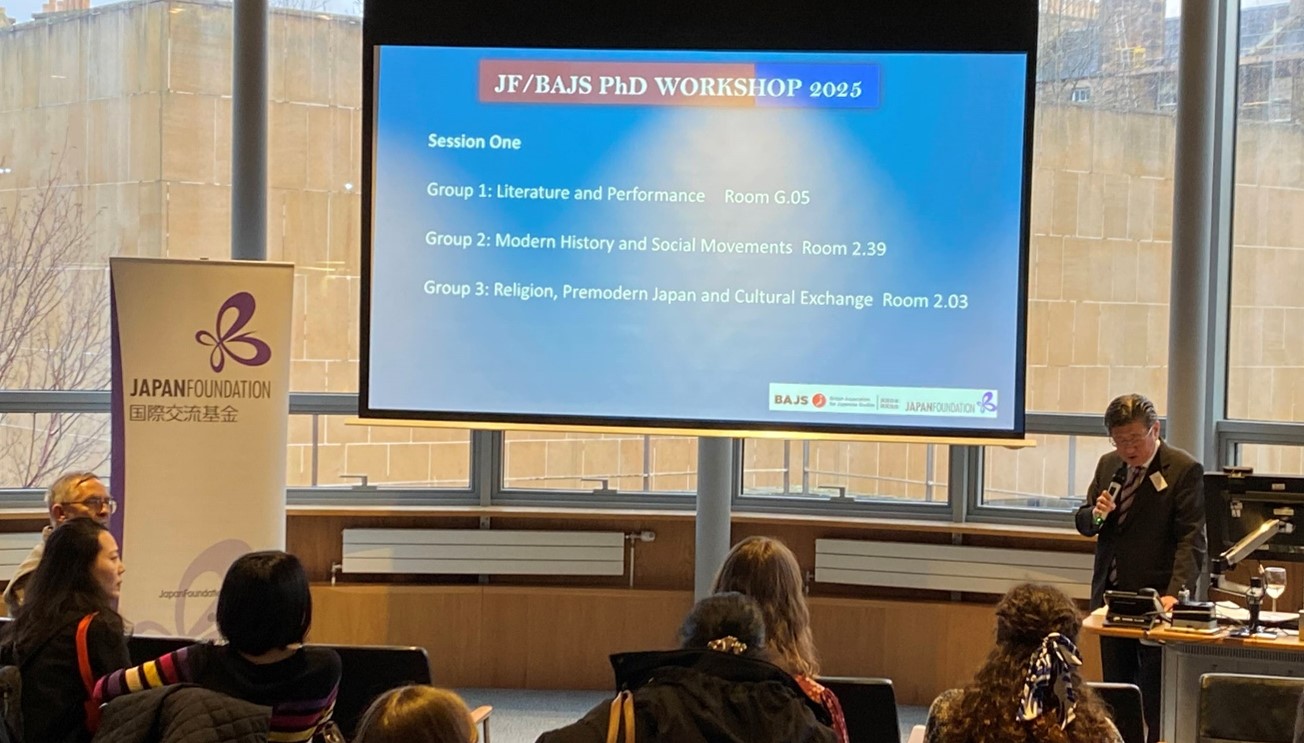
After a long day it was time for the drinks reception. We were extremely honoured to be joined by Mr Tadashi FUJIWARA, Consul General of Japan in Edinburgh, who delivered a speech about the power of Japanese Studies and the close ties that Scotland and the rest of the UK has with Japan. Prof Peter Kornicki from BAJS and Mr Shin-ichi Tanaka from JF also gave impromptu final remarks, about how impressed they had been with the presentations and conduct of the students at the workshop, and how this filled them with optimism about the future of Japanese Studies in the UK.
As always, it was such a pleasure to see so many students from all sorts of disciplines, backgrounds, and at different stages of their career, mingling, networking, enjoying making connections with their peers and the academics.
We would like to thank all the students, academics, funding institutions, and other esteemed guests for joining us for another wonderful workshop.
Particular thanks to The University of Edinburgh for their tireless efforts in helping to make the workshop a success, and for hosting us in their beautiful space!
As ever, the workshop would not have been possible without our co-organisers at the British Association for Japanese Studies (BAJS), and we would like to extend our thanks to their ongoing cooperation in organising this event with us.
We look forward to another event supporting Japanese Studies in the future!
24/01/2025
On Thursday 16th January, we were extremely honoured to invite Professor Simon Kaner, Executive Director and Head of Centre for Archaeology and Heritage at the Sainsbury Institute for the Study of Japanese Arts and Cultures (SISJAC), to speak on the extensive work that SISJAC has carried out recently and over the years, placing this work in context of the wider field of the study of Japanese Arts and Cultures. He explored the impact this exposure to Arts and Cultures can have on society, and our personal well-being.
This talk was held specially to commemorate the fact that SISJAC were selected as one of the recipients of the Japan Foundation Awards 2024.
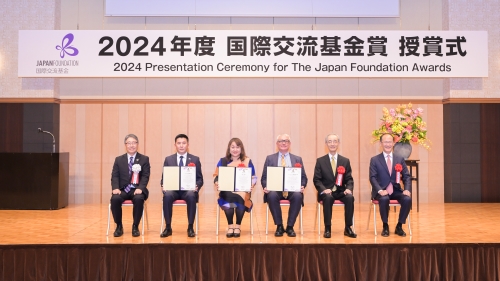 Recipients of the JF Award 2024 at the official Presentation Ceremony in Tokyo, Oct 2024.
Recipients of the JF Award 2024 at the official Presentation Ceremony in Tokyo, Oct 2024.
Every year the Japan Foundation presents the Japan Foundation Awards to individuals and organisations that have made significant contributions to promoting international mutual understanding and friendship between Japan and other countries, through academic, artistic, and other cultural avenues. Previous recipients of the Award over the years have included such individuals as film directors Hayao MIYAZAKI and Hirokazu KOREEDA, as well as author Haruki MURAKAMI.
In 2024, the award was given to artist Chiharu SHIOTA, the Association of Japanese Language Teachers of Mongolia, and the Sainsbury Institute for the Study of Japanese Arts and Culture.
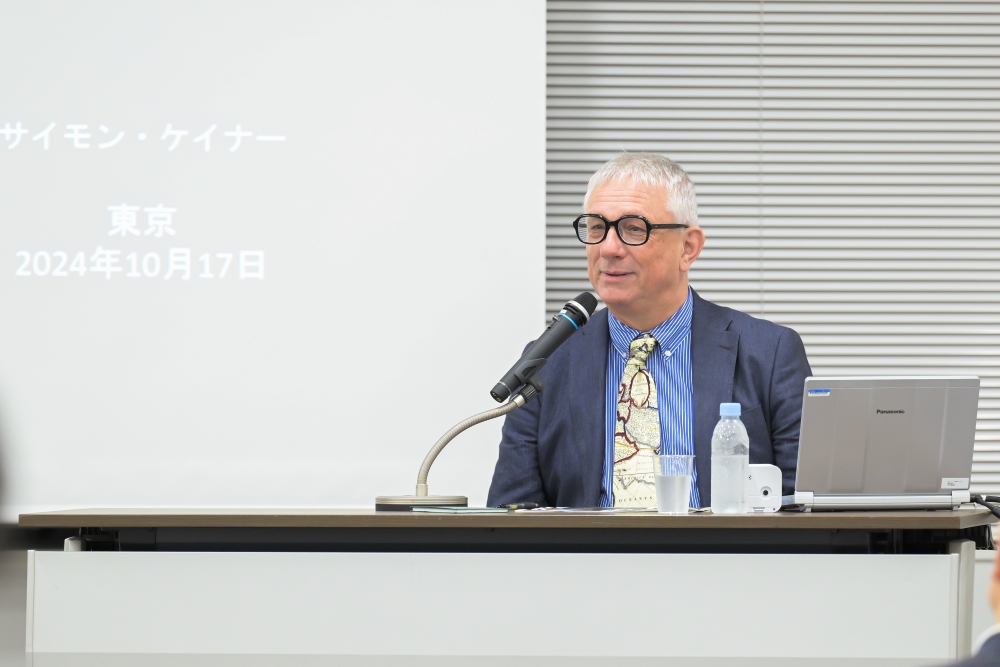
The official ceremony for the Awards was held in Tokyo, in October 2024. Professor Kaner delivered a speech at the time, entitled ‘How Japanese Arts and Cultures Can Make Us Happier’. As SISJAC is a UK-based institution, it only seemed right to invite Prof Kaner to deliver the talk to an audience in England, to continue to celebrate its receival of the Award!
We were very pleased to welcome so many audience members, gathered in-person in the event hall at Japan House London, as well as many who were viewing the livestream. The talk was also broadcast live as part of SISJAC’s Third Thursday Lecture series (*). It was a privilege to provide a platform for Prof Kaner’s expertise with an audience from both the UK and farther afield.
The talk began with an introduction from Mr Shin-ichi TANAKA, Director of the Japan Foundation London, who provided background to the significance of the Japan Foundation Awards, before introducing the Sainsbury Institute and Professor Kaner, who was then welcomed to begin his talk.
Professor Kaner began by thanking the Japan Foundation for the support over the years. In fact throughout his talk, we got a real feeling of how collaboration, communication and exchange between individuals and institutions, at a regional, national, and international level, can have a huge impact on the happiness on a personal and societal level.
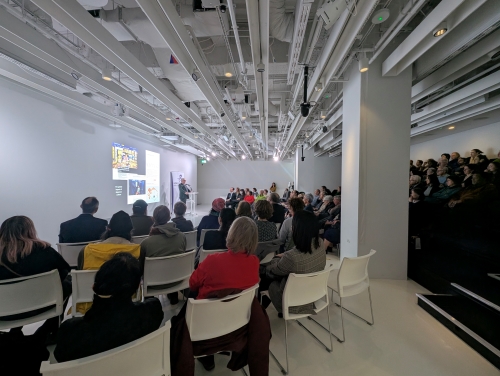 A packed audience!
A packed audience!
The talk covered SISJAC’s widespread and ground-breaking work in bridging the gap between Japan and the UK. Including bringing a 12m Kannon Bosatsu scroll from Hasedera temple in Nara Prefecture to be suspended in the centre of Norwich, and their project ‘Circles of Stone: Stonehenge and Prehistoric Japan’ which compared Japanese stone circles of the middle and late Jomon periods to Stonehenge, built and used during roughly the same period. Work like this really exposes the wider public to Japanese Arts and Cultures, bringing awareness of the world’s similarities and differences.
Professor Kaner also discussed the concept of our happiness and wellbeing as a whole, introducing different studies to the audience such as “Wellbeing and the Historic Environment” by Sarah Reilly, Claire Nolan, and Linda Monckton, wherein the impact that the “Historic Environment” can directly have on our wellbeing is detailed.
He ended his talk on an extremely inspirational note, taking examples and quotes from different individuals such as colleagues, students, friends and experts in the field, to really explain what studying Japanese Arts and Cultures has meant to them. Through communities that we can build, wisdom that we can learn and adopt, beauty in shared experiences, we can learn not only about other cultures, but also about our own society. What can be a happier experience than that?
Here are just a few comments from audience members, when asked “What part of the event was most interesting to you?”:
“How looking at particular cultural moments or artefacts can create opportunities for both local populations and to create international co-operation and understanding”
“I always enjoy how Prof. Kaner places cultural practices from past and present in a broader perspective”
“The way that people engage with Japanese culture and find joy and relief in it, although culture and time are so different.”
“As a student, I enjoyed what Prof Kaner shared about the history of Japanese Studies in the UK.”
We would like to thank Professor Simon Kaner for delivering such a thought provoking, entertaining, and inspirational talk.
Additional thanks to the Sainsbury Institute for the Study of Japanese Arts and Cultures for their partnership in this event. (*) SISJAC regularly organises and hosts Japan-related events, including their Third Thursday Lecture online talk series. Please check their website for more information on SISJAC and their events: https://www.sainsbury-institute.org/
Thank you to Japan House London for partnering us for this event, and for allowing us to use their wonderful event hall.
28/08/2024
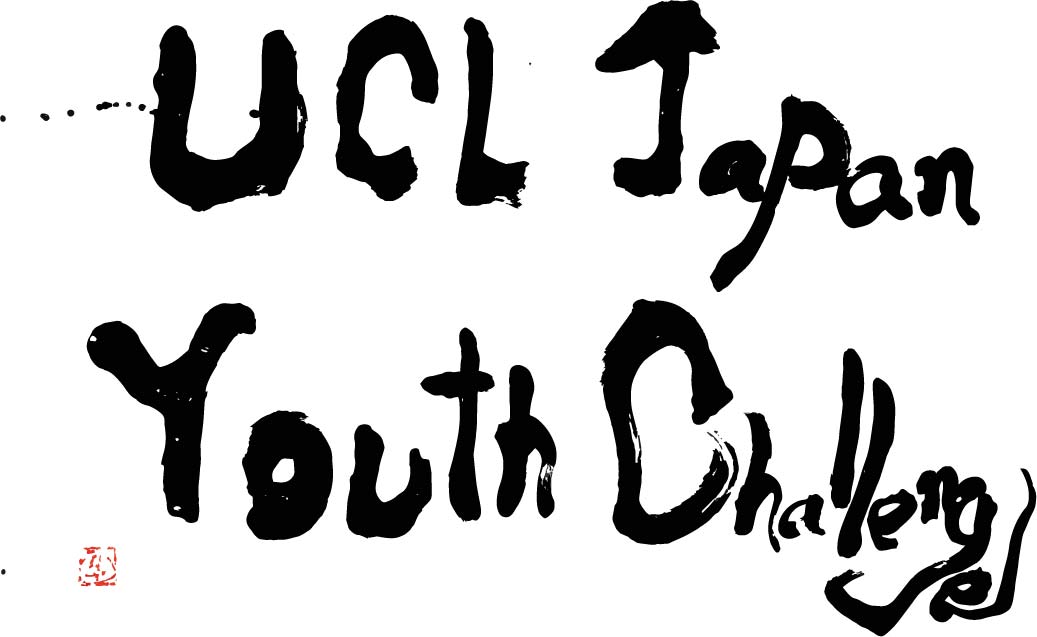
For the full programme outline of the UCL-Japan Youth Challenge 2024, click here.
This year, the UCL-Japan Youth Challenge celebrated its 10th anniversary with another successful week that celebrated cultural exchange between Japan and the UK.
Just under 30 students from the UK and 50 students of pre-university age from Japan attended this year’s prestigious summer school, spending a week undertaking a wide range of activities from lectures and workshops under leaders in academic and professional fields, to sightseeing and social activities.
The programme began on Saturday 27th July at Rikkyo School in Surrey, England, for the welcome day. Each school from Japan made a presentation to introduce themselves and their school lives, as well as their hugely diverse range of hobbies and interests. It was fascinating to learn about Japanese school culture, and the talented individuals who would be joining this year’s programme. The UK students also had their chance to introduce themselves!
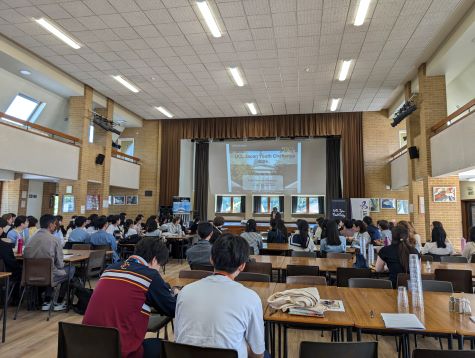
After the presentations, the students enjoyed lunch together, before an afternoon of ice breaking team activities. The day ended with a barbecue in the bright sunshine.
On Sunday, the students had the chance to visit and take a tour of UCL’s Mullard Space Science Laboratory in Surrey Hills, a world-leading research centre developing cutting-edge space research and space technology, before heading to Cambridge for their first night of stay. The participants experienced a Cambridge University formal dinner in the beautiful dining hall at Peterhouse.
On Monday, there was a morning of lectures at Hughes Hall. Prof Tamsin Ford, Professor of Child and Adolescent Psychiatry described her research in Mindfulness-Based Cognitive Therapy (MBCT) and its impact on adolescent non-responders to first-line treatments for depression. Her talk roused a lot of interest among the students, who asked many interesting and well-considered questions afterwards. This was followed by a lecture by Dr Ricardo Sabates Aysa who spoke about the challenges of implementing compulsory education systems, and a talk on soft materials in robotics by Mr Michael Ishida. Sir Laurie Bristow, President of Hughes Hall, also spoke about his experiences during the UK's withdrawal from Afghanistan.
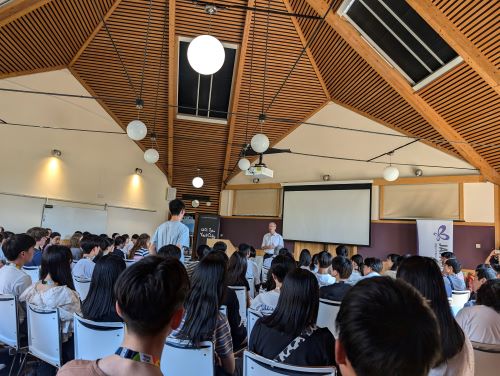 After the lectures, the students had the opportunity to go sight-seeing in Cambridge, where they also enjoyed punting on the river on a warm summer's day.
After the lectures, the students had the opportunity to go sight-seeing in Cambridge, where they also enjoyed punting on the river on a warm summer's day.
On Tuesday, it was time to go to London! The students headed straight for UCL, where they began their Grand Challenge workshop. The year's topic ‘Space and Us’ was introduced. They were encouraged to think about different issues regarding space travel, first on a broader level, then with more detail, before choosing the topics they wanted to work on for their presentations.
Ideas included the sustainability of space exploration, using space exploration for the benefit of the earth, legal frameworks around the ownership of space, and how to protect the mental health of space explorers.
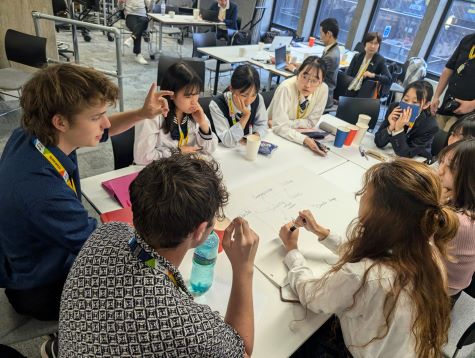 The students defined their missions, considering which factors would help and hinder their projects. They shared their ideas in English, using their knowledge gained from their experiences in different cultures. This provided the groundwork for their presentations at the symposium which they continued to work on during the week.
The students defined their missions, considering which factors would help and hinder their projects. They shared their ideas in English, using their knowledge gained from their experiences in different cultures. This provided the groundwork for their presentations at the symposium which they continued to work on during the week.
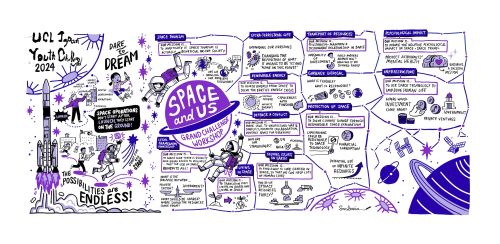 Illustration by Scriberia
Illustration by Scriberia
On Wednesday the students took language lessons. The Japanese students attended an Advanced English language class, while the students from the UK attended Japanese lessons!
They then attended lectures on Nanoelectronics, behavioural genetics, and the politics of Eurasia, before working on their group presentations.
Thursday's programme included a tour of UCL and its facilities, to give the attendees more insight into life at a top university in the UK.
After lunch, Prof Nick Tyler, an expert in Civil Engineering, detailed how civil engineering can be used to make the world more inclusive and to improve accessibility. This was followed by Prof Davide Ravasi from the UCL School of Management, who shared his expertise in design and innovation, challenging the students to think about what makes a good or bad designed item.
The Japan Foundation, London then delivered a presentation on the Japan Foundation's work in promoting mutual understanding and exchange between Japan and the rest of the world, and to give the attendees an insight into what it is like to work at an intercultural organisation.
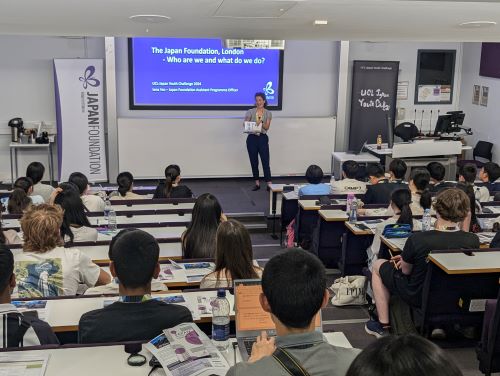
On Friday 2 August, The UCL-Japan Youth Challenge Symposium was held. It was opened with a Biwa performance by Mr Satoshi Takemoto, who explained the history of the Biwa and the significance of the pieces he played, while demonstrating a few songs on the traditional Japanese instrument.
After this, we had talks on the sun and its properties by Prof Lucie Green, and Mr Yutaro Tanaka from Mitsubishi Electric Europe explained how the company contributes technology for space travel and research.
The student presentations were next, and it was an opportunity for the students to show off their hard work during the week. Each group delivered a short presentation, followed by a Q&A session with the audience of academics and members of the public. The students covered things such as how to use space to fight climate change on earth, the challenges and benefits of space tourism, how to create a global body to prevent a potential ‘space war’, etc.
It was incredibly inspiring to see the teamwork and effort that had gone into the presentations. They answered the difficult questions from the audience with great consideration.
There were two final lectures that ended the week on a high. Dr Kate Kitagawa, Senior Counselor for International Relations at the Japan Aerospace Exploration Agency (JAXA) spoke about working for a space-related organisation coming from a non-science background. She emphasised how an individual’s special talent or skills can be used in different ways.
Next, Prof Anu Ojha OBE, Director of Championing Space from the UK Space Agency spoke about how fascinating space exploration is, the expansiveness of the universe, and discussed how important space exploration is for understanding life on earth.
After a week packed with activities, there was time to decompress with the reception, with delicious Japanese food and drinks. To commemorate the 10th anniversary of the programme, many related individuals and supporters of the Youth Challenge, including the Mayor of Camden, also attended.
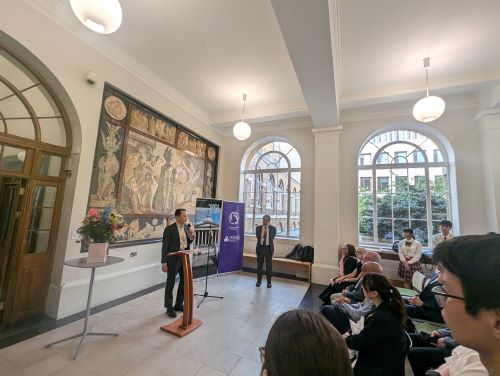
The Director of the Japan Foundation, London also extended our congratulations.
Saturday was the final full day of the programme, which was a London sightseeing day in groups, followed by a farewell party with pizza!
It was another successful and interesting year with the UCL-Japan Youth Challenge.
We would like to offer a huge congratulations and thanks to the organising committee of the UCL-Japan Youth Challenge.
To find out more about this year’s programme and keep up to date with information about future programmes, please visit the UCL-Japan Youth Challenge official website here.
17/06/2024
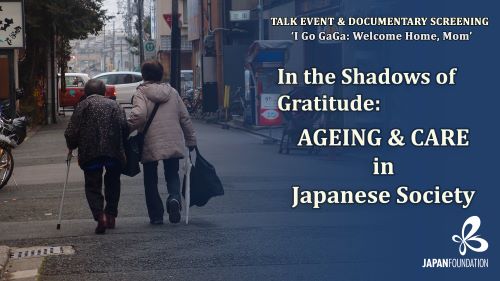
On Wednesday 5 June, we were proud to invite Dr Jason Danely, Reader of Anthropology at Oxford Brookes University and Chair of the Healthy Ageing & Care Research Innovation and Knowledge Exchange Network to join us for our event, "In the Shadows of Gratitude: Ageing and Care in Japanese Society", as part of our Japan Foundation seminar series held at Japan House London.
The event started with a welcome by Mr Shin-ichi TANAKA, director of the Japan Foundation London, followed by an introductory talk by Dr Danely, who gave us some background on the current situation in Japan's ageing society, where growing numbers of the elderly are looking after one another in the spaces of their own homes.
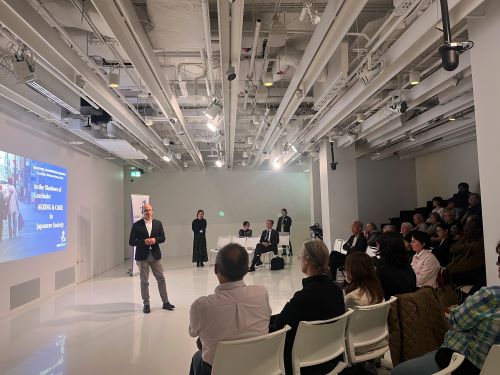
We then watched the documentary film, 'I Go Gaga: Welcome Home, Mom' (ボケますから、よろしくお願いします。お帰りなさいお母さん, 2022)by director Naoko NOBUTOMO. NOBUTOMO depicts her octogenarian mother's experience with Alzheimer's disease, and her nonegenarian father's efforts to look after her. The documentary is an intimate portrayal of a family's experience with old age and care, a follow up to NOBUTOMO's successful feature-length directorial debut, 'I Go Gaga My Dear' (2018), which was featured as part of Japan Foundation Touring Film Programme 2020.
The documentary was incredibly moving, a raw and truthful depiction of the NOBUTOMO family's reality. Afterwards Dr Danely led a Q&A discussion session with the audience, where he shared his expertise on issues depicted in the film, as well as wider insight into the care system in Japan.
It was an interesting, thought-provoking and often emotional evening.
We would like to thank Dr Jason Danely for giving his time in leading the evening, and our friends at Japan House London for all of their support in hosting the event.
07/03/2024
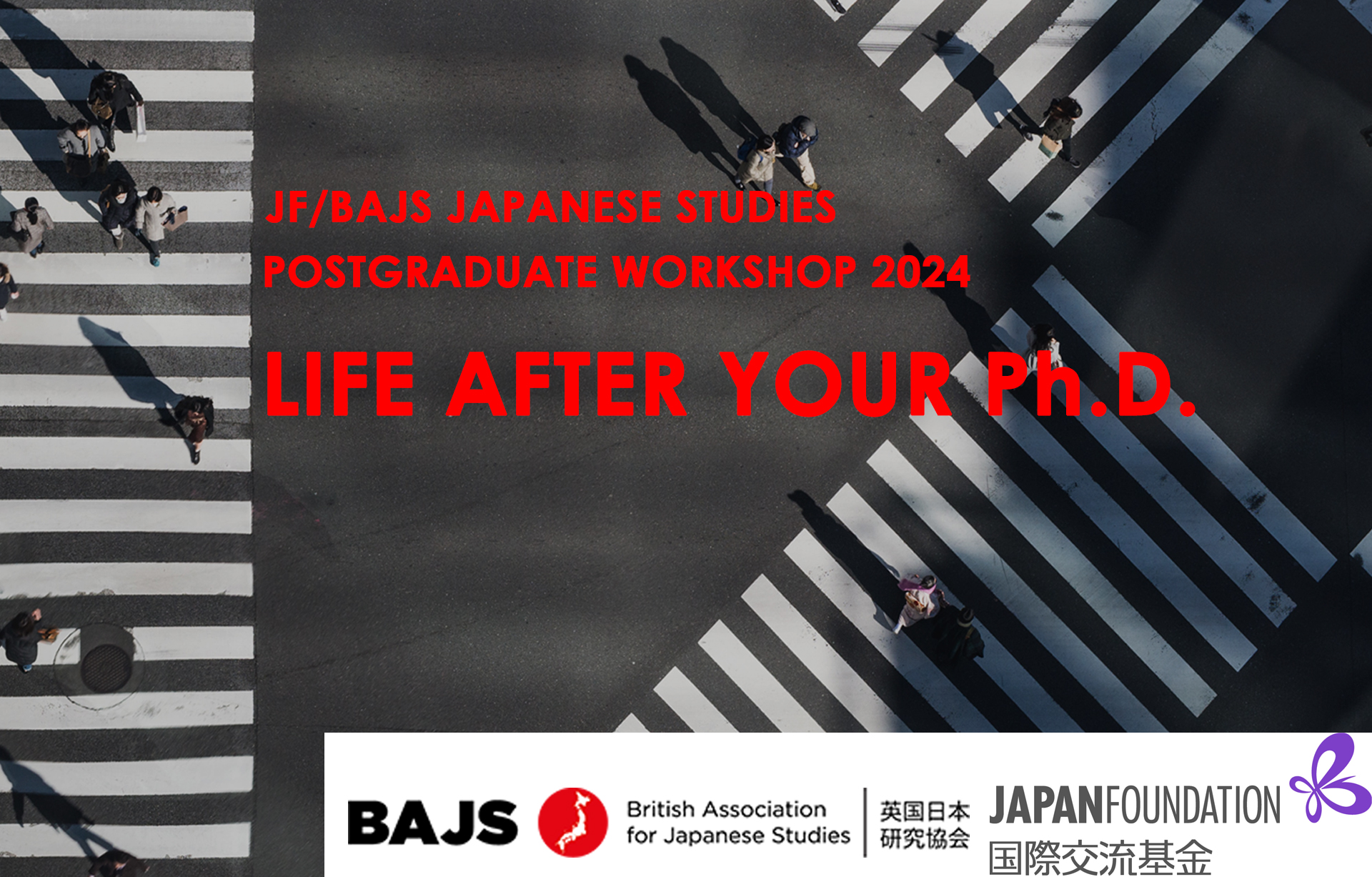
On Friday 2nd February, we hosted our 13th JF/BAJS Postgraduate Workshop at the University of Sheffield.
This year, we were joined by 27 PhD students from universities all over the UK. Our attendees all research a wide range of topics, and it was illuminating to hear what current postgraduate students are interested in studying. Seven academics also joined us for the day’s events: Dr Jamie Coates, Prof Jennifer Coates, Dr Thomas McAuley, Dr Martyn Smith and Dr Anna-Viktoria Vittinghoff (University of Sheffield); Dr Christopher Hayes (Teesside University); and Prof Peter Kornicki (University of Cambridge).
.jpg)
The morning kicked off with welcome speeches from Dr Thomas McAuley, director of Learning and Teaching at the School of East Asian Studies, University of Sheffield; Prof Peter Kornicki, president of BAJS; and Mr Shin-ichi TANAKA, director of the Japan Foundation. They each reinforced the importance for exchange and communication to enhance the future of Japanese Studies.
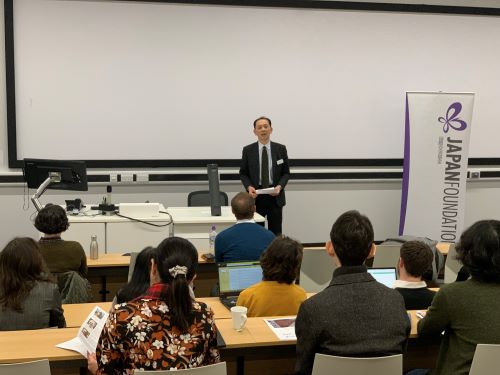
Then, all students and academics moved to separate seminar rooms, where they would spend the morning in groups based on their areas of study. Each student had the opportunity to present their research to the others in their group. The attendees presented on their research for 10 minutes, and then they had time after their presentation to answer a few questions from their peers and the academics assigned to facilitate.
Topics this year were varied as always, covering law, literature, history, art, linguistics, to name a few. After each presentation, the groups fed back to one another asking questions, making suggestions. It was heartening to see the students getting so involved. The participants ranged from PhD students in their first years to those in their final years. This range in experience meant that everyone was able to contribute different types of input.
After the morning session we enjoyed a long lunch break, where the students mingled, networked, and discussed their research in depth with one another, as well as with the academics who were in attendance.
We then moved on to the afternoon session, which consisted of two excellent talks.
First, Prof Jennifer Coates, Professor in Japanese Studies at the University of Sheffield and Honorary Secretary of the British Association for Japanese Studies, delivered her talk, Intercultural Superpowers for Academia. Prof Coates spoke about her experience in working abroad in Japan after her PhD, the advantages of moving abroad, and how this experience can provide ‘intercultural superpowers’ that can be utilised upon returning to your home country.
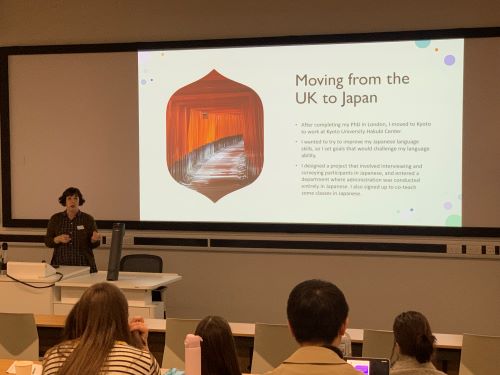
The second lecture on the Current Academic UK Hiring System was delivered by Dr Thomas McAuley. Dr McAuley gave useful insights into the current situation within academia, the recruitment environment, navigating job advertisements, preparing applications and how to tackle interviews. It was highly informative and useful for those interested in how to get a job in academia post-PhD.
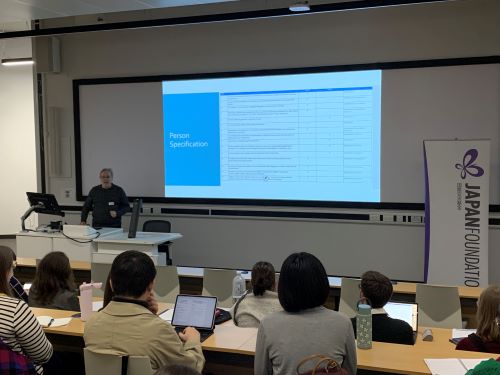
After the academic talks, we had a tea and coffee break where, again, students were able to network with one another.
After this break, we entered our final session for the day. This was a Q&A with the attending academics, where students could ask questions about both the theme of the workshop, as well as more general questions and concerns that they could raise regarding Japanese Studies.
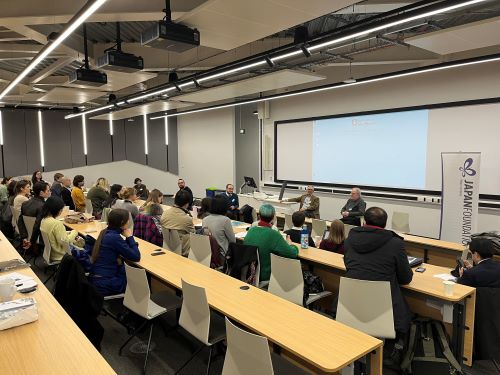
Finally, there were talks about funding opportunities within Japanese Studies from the Embassy of Japan in the UK, the Great Britain Sasakawa Foundation, the British Association for Japanese Studies, and the Japan Foundation.
The day ended with a well-deserved drinks reception and canapes.
The Japan Foundation would like to thank the British Association for Japanese Studies for their collaboration in co-organising this event with us, as well as the academics who attended for giving up their valuable time. We would also like to thank the University of Sheffield for their hard work and assistance in hosting the event.
Thank you to the funding institutions (The Great Britain Sasakawa Foundation, The Embassy of Japan in the UK) who spoke in the final session, and to Nikkei Europe LTD for joining us and setting up a booth. A special thank you to the students for participating in the day with such enthusiasm. We hope to see many of you again at next year’s workshop!
15/12/2023
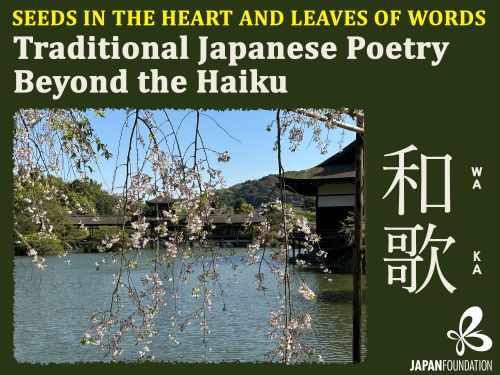
We were honoured to invite Dr Thomas McAuley, Senior Lecturer in Japanese Studies at the University of Sheffield, to give the talk, Seeds in the Heart and Leaves of Words: Traditional Japanese Poetry Beyond the Haiku on Thursday 7 December at 18:30, in the event hall at Japan House London.
We embarked on a journey into traditional Japanese poetry, focusing on ‘Yamato-uta’, or ‘Waka’ (和歌 (Waka) = 和 (Wa): Japanese, 歌 (Ka): Song or Poem), to introduce us all to a different poetic form that predated the poetic form of Haiku that is so well known around the world. How poetry was so integral in the daily life of nobles, used to show status, in courtship, in expressing themselves, was rendered to us through Dr McAuley’s enthusiastic and engaging poetic examples and demonstrations.
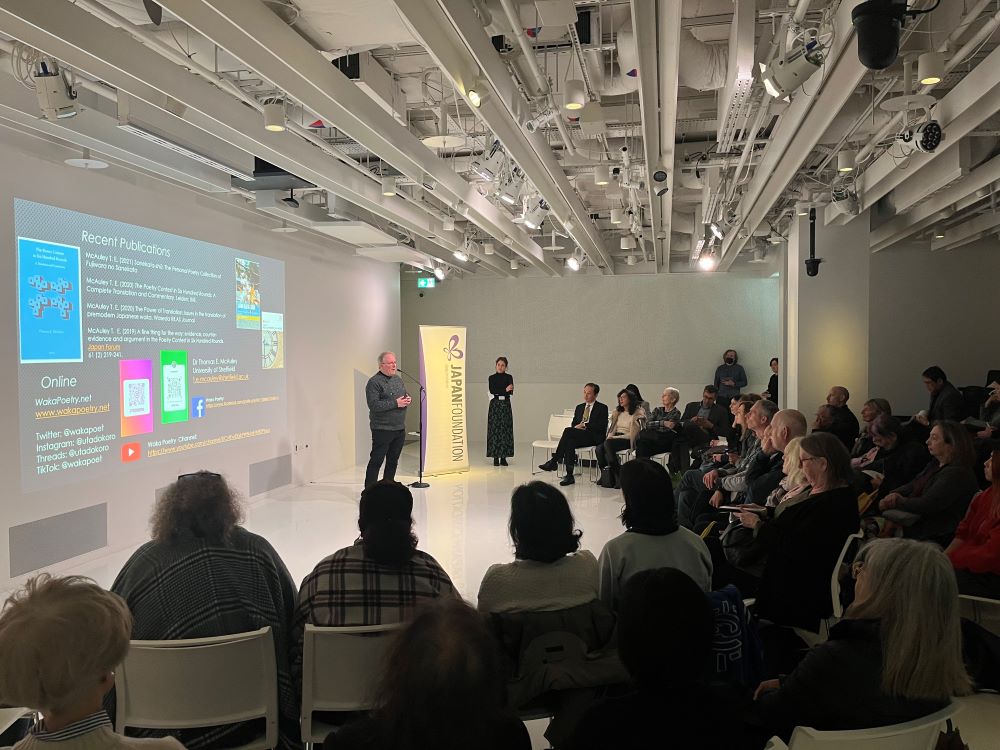
For an hour, it felt as though we were transported to Japan. The talk was enthusiastically received, according to the large number of questions during the Q&A at the end, and the positive comments from our audience members afterwards.
Here are a small handful of comments we received:
‘[The] speaker was lively, vivid, always interesting and his talk really illuminated waka poetry. Fabulous talk!’
‘Dr Macauley’s astounding expertise and facility in the topic together with his measured and very entertaining and accessible style [were the highlights].’
‘It was all interesting and completely new to me. Excellently delivered and illustrated talk.’
Thank you to everyone who came along for the fun and fascinating evening! We would also like to thank Dr Thomas McAuley for his time, and Japan House London for their assistance in hosting the event.
We will be planning more talks in the future. Keep an eye on our website, Social Media (Twitter, Facebook, Instagram) or sign up to our e-bulletin so you don’t miss out!
15/12/2023
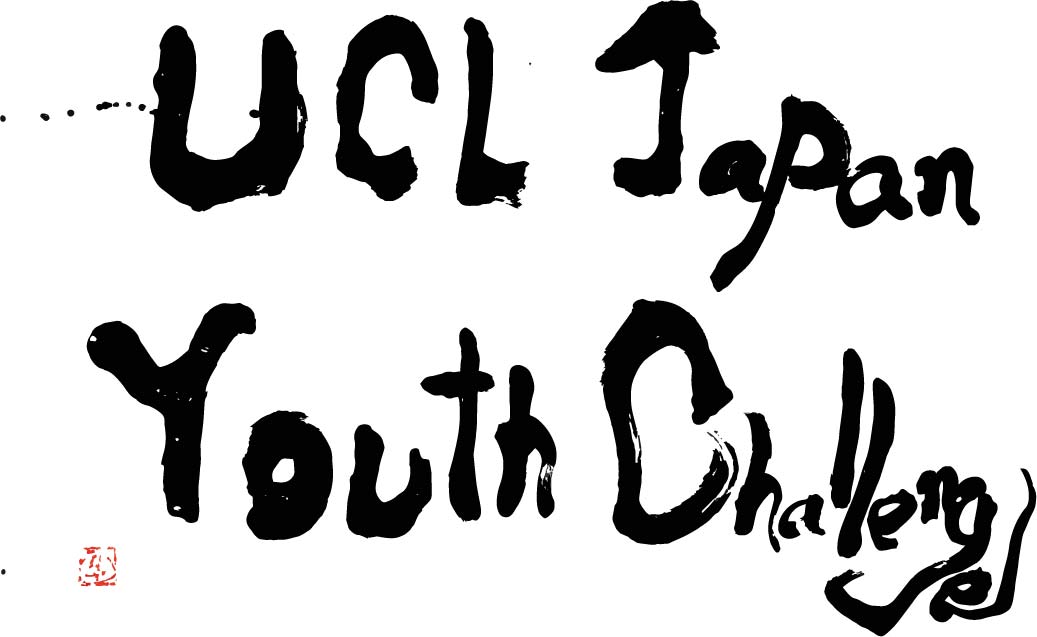
UCL-Japan Youth Challenge 2023
This year, the UCL-Japan Youth Challenge returned for its ninth iteration and we were proud to support the programme once again.
For the first time since 2019, the programme was able to take place in person. 49 pre-university students from Japan came to England to meet 27 students from around the UK for this week-long prestigious summer school.
On the first day of the programme, the students gathered at Rikkyo School in Surrey, England. The 76 student participants introduced themselves to one another through group presentations, learning about each others’ school programme in Japan as well as their extensive hobbies and interests.
They then enjoyed a relaxed start to the week with fun ice breaking activities and a typical British experience of a barbecue on a rainy summer’s day.
After the welcome day, the students enjoyed a varied and interesting programme, including visits to Cambridge University, UCL and Camden Town Hall. They experienced university-style lectures and talks spanning multiple disciplines, all around the theme of ‘Resilience’!
At Cambridge University, the students had a real university experience, staying for two nights in Robinson College. The programme included sightseeing and punting, as well as university-style lectures.
Sir Laurie Bristow KCMG, president of Hughes Hall Cambridge, described the resilience needed during his work as the Ambassador to Afghanistan during the fall of the Taliban in 2021, which gave the participants much food for thought.
They then heard from academics about how soft materials could be used in robotics, air pollution toxicology, and more fascinating talks.
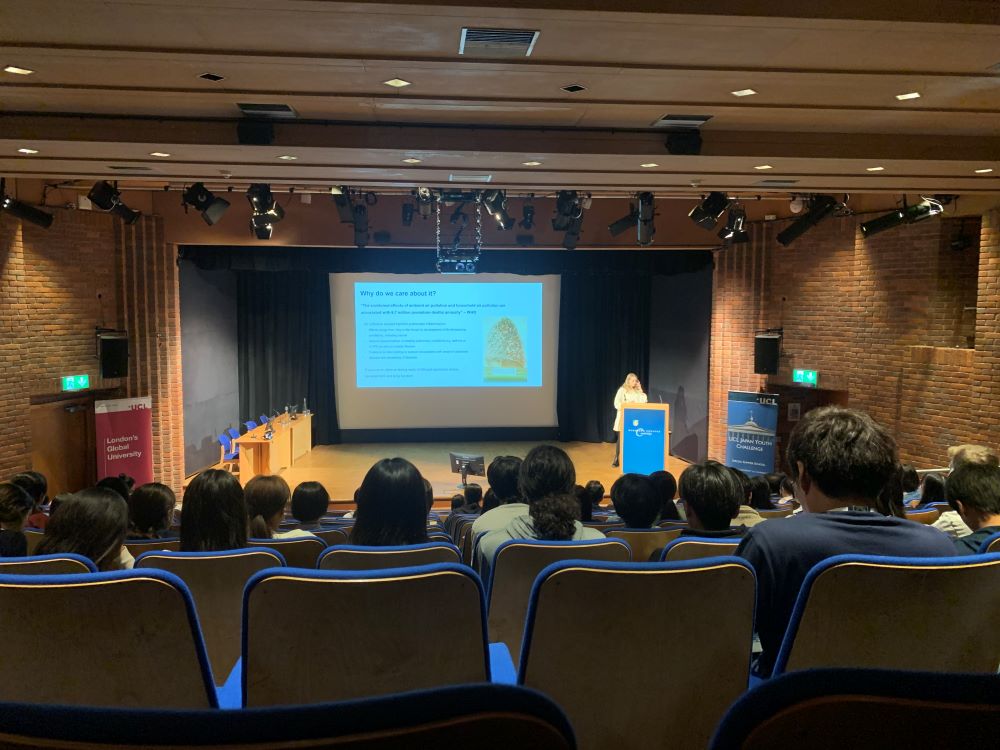
Students listen to a lecture on air pollution in Robinson College, Cambridge.
After an illuminating programme in Cambridge, the students travelled down to London for a few days at University College London (UCL). At UCL, they again experienced lectures from experts and academics, including a visit to Camden Town Hall to meet the Mayor of Camden Town.
Teamwork was also key, as the students were split into groups during workshop sessions, to discuss and prepare their presentations for this year’s theme of ‘Resilience’, as part of the UCL Grand Challenge. With the help of experienced workshop leaders, all participants participated in engaging and inspiring discussions about what ‘Resilience’ could mean, and how the world could be more resilient.
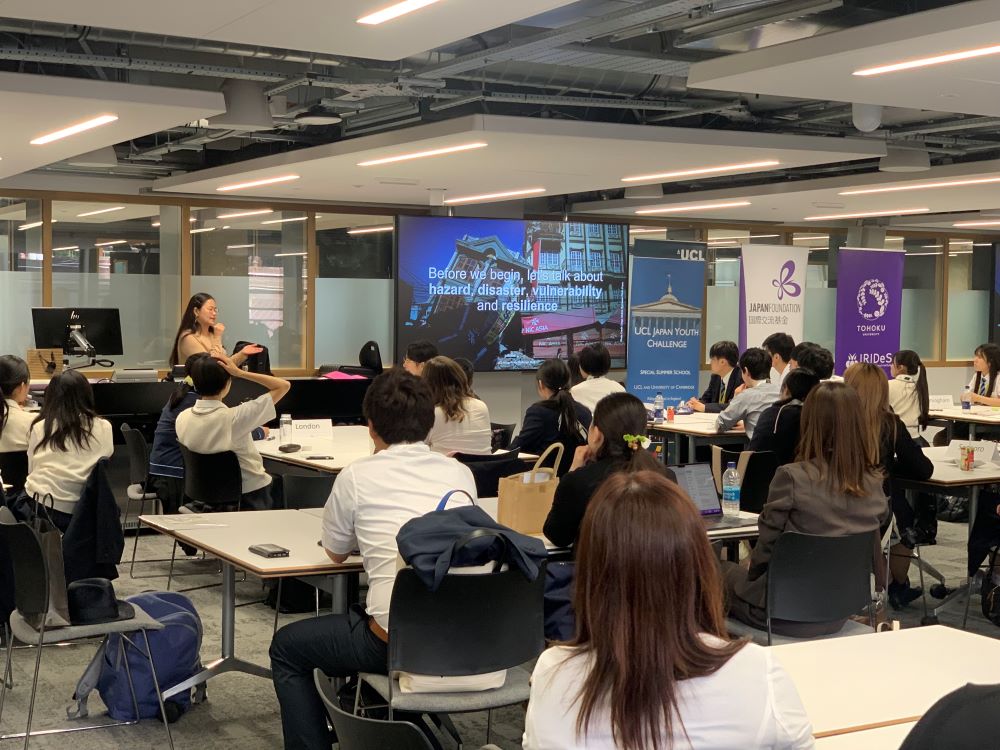
Students exploring ideas of resilience during a workshop in UCL.
The students presented their ideas during the UCL Grand Challenge Symposium, which took place in a large lecture theatre in UCL, to members of the public. The presentations were made in English, with each student able to present their own ideas. It was so inspirational to hear what solutions pre-university age students had for issues in the world.
Topics included: diversity in the workplace, artificial intelligence, cultural understanding, and environmental issues. It was fascinating to hear the speeches made by our Japanese and UK student participants. They compared their experiences from the perspective of both countries, and lots of interesting ideas were shared.
We are already looking forward to next year’s UCL-Japan Youth Challenge and hope that many new students will join us.
To find out more about this year’s programme and keep up to date with information about future programmes, visit the UCL-Japan Youth Challenge official website at: https://www.ucl-japan-youth-challenge.com/programme-2023/
.jpg)
illustrated by Scriberia
01/09/2023
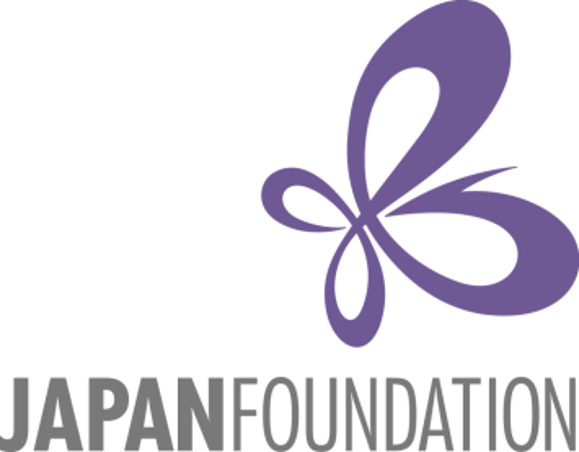
*Applications Now Open* - Japan Foundation Fellowships, jointly organised with Tobunken and Nichibunken
To promote Japanese Studies overseas, the Japan Foundation has jointly organised two separate Fellowship programs, together with the Institute for Advanced Studies on Asia of the University of Tokyo ("Tobunken") and the International Research Centre for Japanese Studies, National Institutes for the Humanities ("Nichibunken").
Each Fellowship provides post-doctoral researchers in the field of Japanese Studies with opportunities to conduct research in Japan, while belonging to the corresponding institution.
Fellows will also be expected to gain experience as project facilitators through operation and management work at various meetings or workshops, and to form and expand networks with people involved in international exchange.
For each program, a few (around three) Fellows will be invited to stay continuously in Japan, for a maximum of 24 months. The proposed commencement date for the Fellowship must fall between September 1, 2024 and March 1, 2025.
Eligibility:
All of the following criteria must be met:
a. Applicants must have received their Ph.D. within six years (regardless of their job status) as of April 1, 2024
b. Applicants must hold nationality or lawful permanent resident status in countries that have diplomatic relations with Japan
c. Applicants must be in good health and proficient in either Japanese or English
Application deadline: Friday 1 December, 2023
Full details, terms and conditions, as well as application guidelines and application forms, can be found on the webpage for each institution.
Information about the programme will become available on the Japan Foundation official headquarters website (https://www.jpf.go.jp/) from Monday 4 September.
Please note, the two programmes are separate from the Japan Foundation Fellowship Programme, for which applications have not yet opened. If you apply for one of these programmes, you may still apply for the Japan Foundation Fellowship Programme once we start taking applications.
If you have any questions, please email r_info@jpf.go.jp
29/03/2023
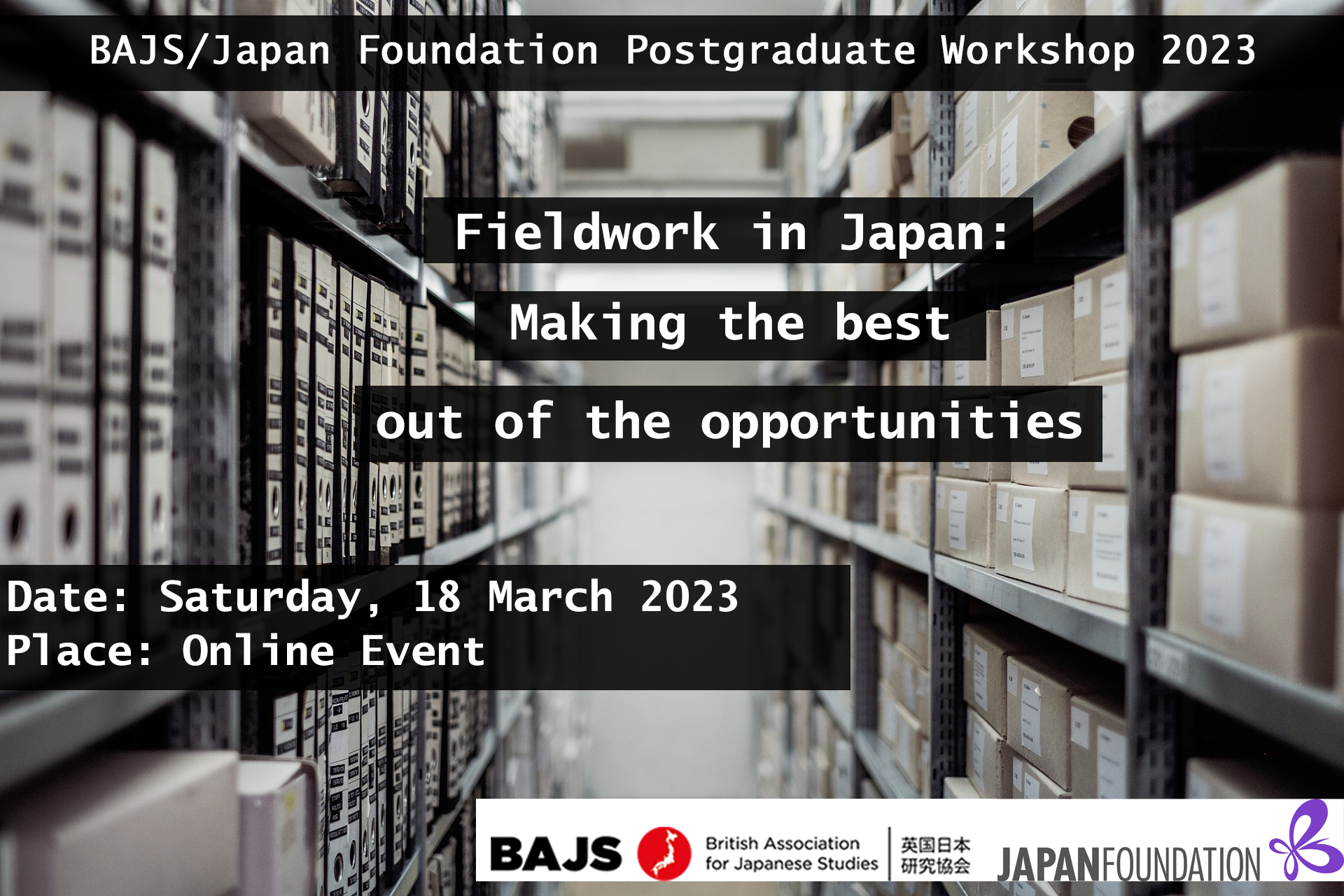
The Japan Foundation/British Association for Japanese Studies Postgraduate Workshop 2023
On Saturday 18th March, we held our annual PhD Workshop, which is joint organised with the British Association for Japanese Studies (BAJS)!
Despite plans to hold the event in person, industrial action affecting transport meant that the event was reorganised last minute to take place online, to give all registrants equal opportunity to attend. 34 students and 6 academics across a variety of disciplines joined the event for a full day of intellectual exchange around the theme of Fieldwork in Japan.
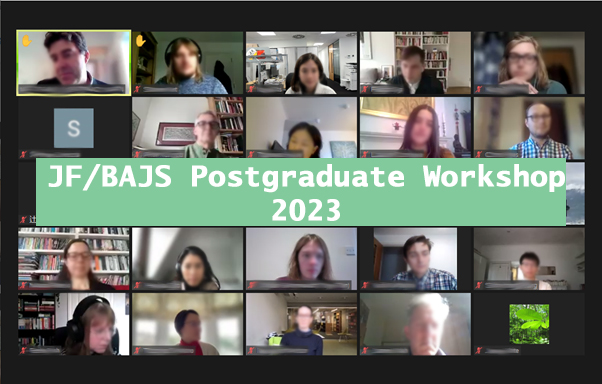
Our day started off with welcome speeches from Mr TANAKA Shin-ichi, Director of the Japan Foundation, and Prof. Peter Kornicki, President of BAJS. Both impressed upon the attendees the importance of events such as this one in bringing together students from across the country and the desire to continue to support Japanese Studies in the future.
The day was split into two parts. During the morning session, students were split into groups based on their areas of study. They presented their research to one another, this year with focus placed on issues they were having with their fieldwork or research.
After each presentation, the students received individual questions and feedback from the academics in their group and their peers. The morning session was lively, despite the online format! Both the academics and the other attendees challenged the presenting students by asking them pertinent questions about their work. Although the morning session was almost three hours long, enthusiasm did not wane and each student received some helpful feedback that should aid them in their study or fieldwork.
The afternoon session was split into two presentations and a Q&A session. We were lucky to hear two detailed presentations from academics who had been through the experiences that our PhD students had faced.
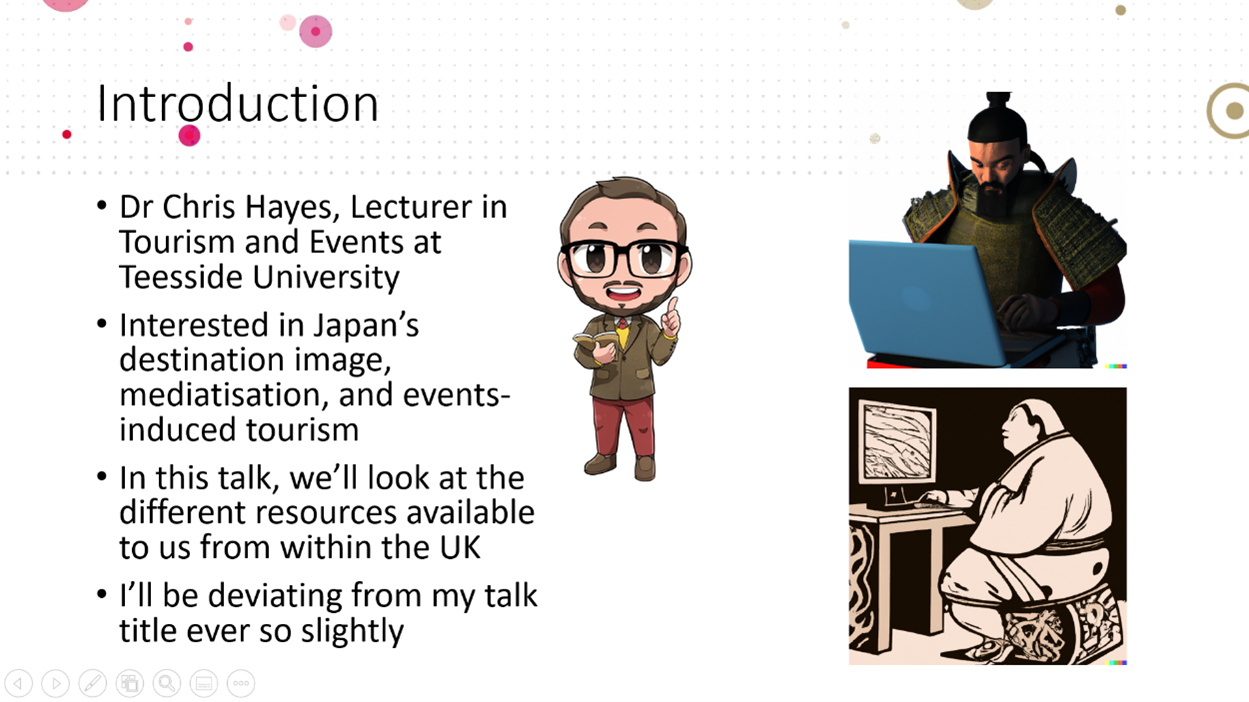
Dr Christopher Hayes, Lecturer in Tourism and Events at Teesside University, gave an insightful talk on Information on Japanese Resources at UK Universities.
Dr Hayes outlined possible difficulties researchers could face in travelling to Japan for fieldwork, and instead gave plenty of alternatives for fieldwork within the UK, at universities and other institutions.
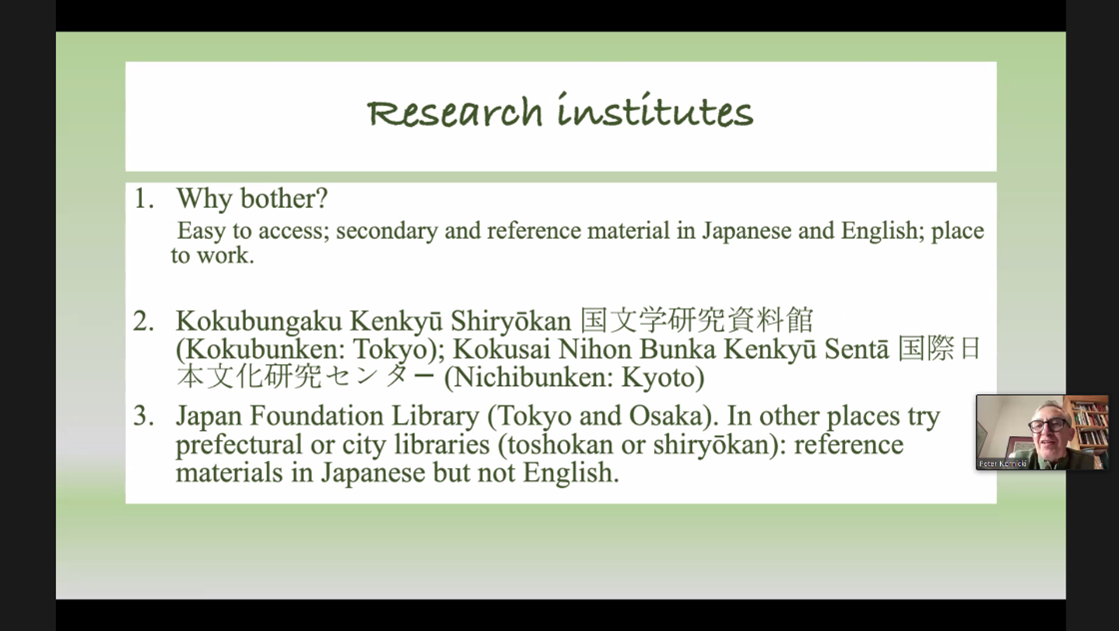
Prof. Peter Kornicki, Emeritus Professor at the University of Cambridge and President of BAJS followed Dr Hayes with his talk: Institutes, archives and resources in Japan: how to find them and how to overcome the ‘gaijin valve’.
Prof. Kornicki painted a detailed picture of his years of conducting fieldwork within Japan and how to make the most out of your time in archives. He told funny stories of his own valuable experiences visiting institutions in Japan.
Following both talks, the six academics in attendance (Prof. Peter Kornicki, Dr Chris Hayes, Prof. Jennifer Coates, Dr Marcos Centeno, Dr Ruselle Meade and Dr Fabio Gygi) assembled for a Q&A session which took up the rest of the afternoon. During this Q&A session, the attendees were invited to ask anything they wanted to know about fieldwork and research in the field of Japanese Studies.
The Japan Foundation, London would like to thank the British Association for Japanese Studies for all their efforts in organising this event. A special thanks as well to the academics who joined us, for giving up their valuable time.
We would also like to thank the funding organisations that sent materials and prepared video presentations for us to send to the attendees.
Next year, we hope that the event will be back to being face-to-face! Please keep an eye on our website for further details in the future.
06/09/2022
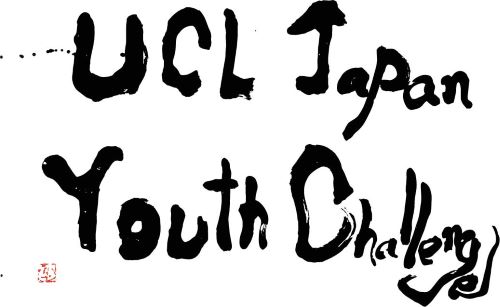
Between 2nd August and 23rd August 2022, the UCL-Japan Youth Challenge held its 8th annual summer school programme for pre-university students. This year, due to continuing difficulties posed by COVID-19, the programme took place online. More than 100 students from the UK and Japan joined to participate in the 3-week course. This year’s theme was “Innovative Enterprises for Sustainable Future”.
Over the course of the programme, the students participated in a wide variety of lectures and workshops. These were delivered by university academics in both the UK and Japan. The topics were diverse and included “The Genes and Neurons of Sleep”, “An Introduction to Linguistics and Linguistics Olympiad”, “Using Stem Cells to Understand and Treat Vision Loss”, alongside lectures which aligned with the programmes theme, such as “Emissions trading and climate policy”.
Although most of the programme took place online, participants within the UK were also invited to spend the day at the UCL campus. Lectures were delivered face-to-face, and attendees were given a tour of the UCL facilities, including their newly built Japanese Garden in the UCL Student Centre.
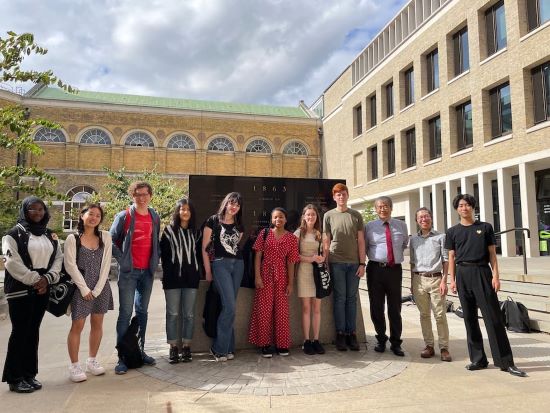
The students also took part in cultural exchange, with UK students learning about Japanese culture and vice-versa. The students also received advice from various organisations about study abroad options, career options, and how to learn about each other’s cultures. Students were often placed into separate groups to discuss different topics with one another, share ideas, and build friendships.
The programme ended with the “Grand Challenge” final presentation day. The students displayed their knowledge, teamwork and skills gained during the course of the programme by delivering presentations on different topics that they had worked on in groups.
The sheer amount of work put in by the students was evident as different groups spoke concisely and confidently on innovative ideas to contribute to a more sustainable future. These ranged from promoting gender equality in the workplace, to creating a rewards based app to encourage consumers to be more sustainable with their buying habits. Each idea was unique, well-researched and professionally presented.
We were very impressed with this year’s participants and their enthusiasm. Throughout the three weeks, they were motivated, engaged, and asked insightful questions.
We were truly inspired by the students and already look forward to next year’s programme in 2023!
For more information and to view the full 2022 programme, please visit the UCL-Japan Youth Challenge official website at: https://www.ucl-japan-youth-challenge.com/programme-2022/
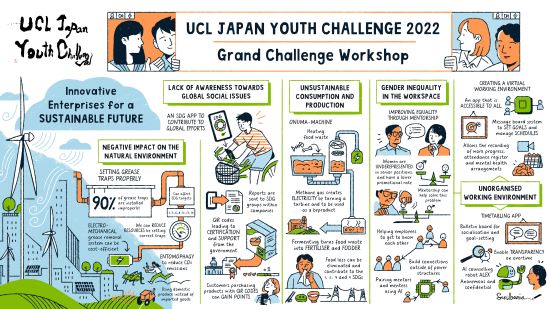 Image Credit: UCL-Japan Youth Challenge 2022, UCL Grand Challenge Workshop illustration by Scriberia
Image Credit: UCL-Japan Youth Challenge 2022, UCL Grand Challenge Workshop illustration by Scriberia
10/03/2022
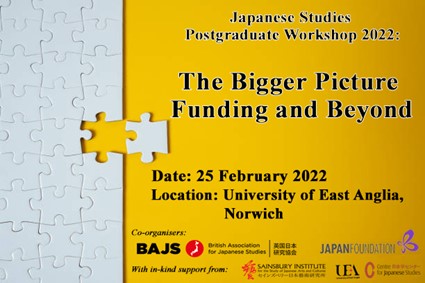
This year The Japan Foundation and The British Association for Japanese Studies were able to come together again in person for the 11th Postgraduate Japanese Studies Workshop. This time the event was held at the University of East Anglia. Students who had waited two years to gather face to face came from across the UK from a variety of institutions. The day involved lectures, presentations, and plenty of networking opportunities. The workshop’s aim this year was to provide students with help and advice on funding opportunities.
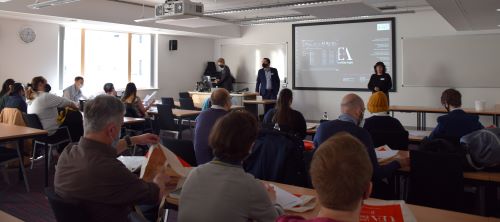
The first session was a student presentation session. Broken into separate groups, students had the opportunity to present their research to their peers. The students took on the challenging task of introducing their subject matter and research objectives within a short time frame. For many, it was the first time presenting their ideas in-person. It was great to hear such passionate and varied presentations from those who were at varying stages in their research. They then received feedback from both their peers as well as from academics in their field, with a broad range of expertise.
During lunch, it was inspiring to see students engaging in lively discussions, networking, and sharing comments and ideas for each other’s research, with people both inside and outside their own research areas.
After lunch, the students gathered in the Thomas Paine Lecture Theatre for session two. Dr Christopher Hood (Cardiff University, president of BAJS), kicked off the presentations. Dr Hood guided students through the various shapes that collaboration can form, and how to undertake collaborative work alongside individual research. Next, Dr Jennifer Coates from the University of Sheffield and BAJS took the podium. With multiple case studies of her own experiences, and advice on how to write successful funding applications, Dr Coates gave the students in-depth and personal insights into the often-overwhelming process of applying for funding.
For the third session of the day, representatives from The Daiwa Anglo-Japanese Foundation and The Great Britain Sasakawa Foundation joined the organisers to introduce the funding opportunities that are available at their organisations, aimed specifically at students in Japanese Studies.

Session four saw Professor Simon Kaner on the podium as keynote speaker. As the Executive Director of SISJAC (Sainsbury Institute for the Study of Japanese Arts and Culture) and Director of the Centre for Japanese Studies at UEA, Professor Kaner was the perfect speaker to give students his expertise on large-scale funding, including how smaller grants can build up to receiving larger ones in the future, and how to keep a track of the reach and impact of your publications. Professor Kaner’s talk was followed by a Q&A session with the panel of assembled academics. Questions ranged from funding to job opportunities within the Japanese Studies sector. With a panel consisting of academics from different disciplines and backgrounds, each question had in depth answers.
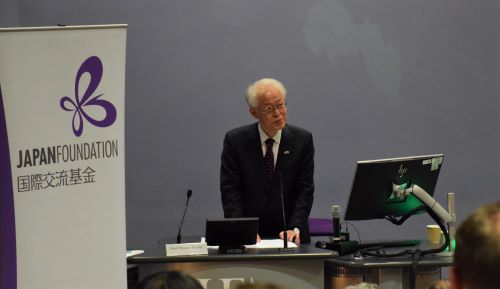
For the final session of the day, the attendees at the workshop had the immense honour of welcoming Ambassador Hayashi from The Embassy of Japan in the UK. Ambassador Hayashi gave an impassioned and encouraging speech acknowledging the importance of the relationship between Japan, the UK, and the rest of the world. He thanked all students and other attendees for their continued dedication to their work and laid out the embassy’s vision for increased multicultural exchange. It was a privilege to hear the ambassador speak and provided encouragement for all attendees after such a tumultuous two years. After the final session, there was a sake and sushi reception for all the attendees, academics, and representatives to get together and network and discuss the day’s events.
The Japan Foundation would like to thank the British Association for Japanese Studies for all their efforts in co-organising this event as well as the academics for giving up their valuable time. We would also like to thank the University of East Anglia and the Sainsbury Institute for Japanese Arts and Culture for their hard work and assistance in hosting the event. Thank you to all the funding institutions (The Daiwa Anglo-Japanese Foundation and The Great Britain Sasakawa Foundation) and The Embassy of Japan in the UK who spoke in the final session, and a special thanks to the students for making our first event in two years so memorable.
22/10/2021
The UCL-Japan Youth Challenge returned for its 7th annual summer school programme. The programme took place online to ensure the safety of all participants. Between 3rd and 24th August, a total of 100 students from Japan joined 35 UK-based students over the course of 4 weeks. This year’s focus was, Art and Design for Sustainable Future.
Over the course, the students took part in lectures and workshops from a wide range of disciplines, delivered by academics from universities in both the UK and Japan. Some of the lectures included “Future Technology: Learning from Intelligence of Insects”, “History of Japanese Calligraphy and Sumi painting” and “Design and Technology for Storytelling”.
The students also took part in cultural exchanges, with UK students learning about Japanese culture and vice-versa. Alongside this, students were guided by various organisations about how they could continue to learn about each other’s cultures and the study abroad options that were available to them.
As always, the summer school culminated in student presentations from the UCL Grand Challenge, themed around the school of the future. The students worked in intercultural groups to showcase what they had learnt over the past few weeks and apply their knowledge to the theme.
For more information about the UCL-Japan Youth Challenge, please visit their website https://www.ucl-japan-youth-challenge.com/
22/10/2021
The Japan Foundation, London partnered with Birkbeck, University of London to present a two-part event: “Japanese Documentary Filmmaker Haneda Sumiko: Authorship and Gender Discourses”.
Two symposia were convened featuring speakers from around the globe speaking on the highly influential film maker Haneda Sumiko. The speakers covered a wide range of disciples and fields including Gender Studies, Film Studies and Authorship.
The first symposium was held on July 22nd. Professor Koji Toba (Waseda University) gave the opening talk entitled, Visualising Invisible Contamination: Haneda Sumiko's TV Programs on Environmental Pollution. This was followed by two panels discussing various aspects of Haneda’s work.
Attendees were also able to view a rare online screening of one of Haneda’s works, Into the Picture Scroll-The Tale of Yamanaka Tokiwa (2004).
The second Symposium, which took place on September 30t, saw a full day schedule. The event was opened by Professor Mitsuyo Wada-Marciano (Kyoto University) with his talk, Making Meaning of Haneda's 'Japanese Women': A Women's College in the Village (Mura no fujin gakkyu, 1957) and The Cherry Tree with Gray Blossoms (Usuzumi no sakura, 1977).
The speakers throughout the day were interspersed with screenings of The Work of Haneda Sumiko: Notes on the Circulation and Distribution of Japanese Documentary and Dedicated Treasures of Horyuji-Temple (Hōryūji ken'nō hōmotsu, 1971). The day was closed with a roundtable discussion looking at multiple aspects of Haneda and her work and a look forward to future research on Haneda Sumiko.
Finally, participants were able to view another work of Haneda online The Japanese Settlers to the Manchuria and Inner Mongolia of Mainland China (Aa Manmō Kaitaku-dan, Haneda Sumiko, 2008).
09/03/2021
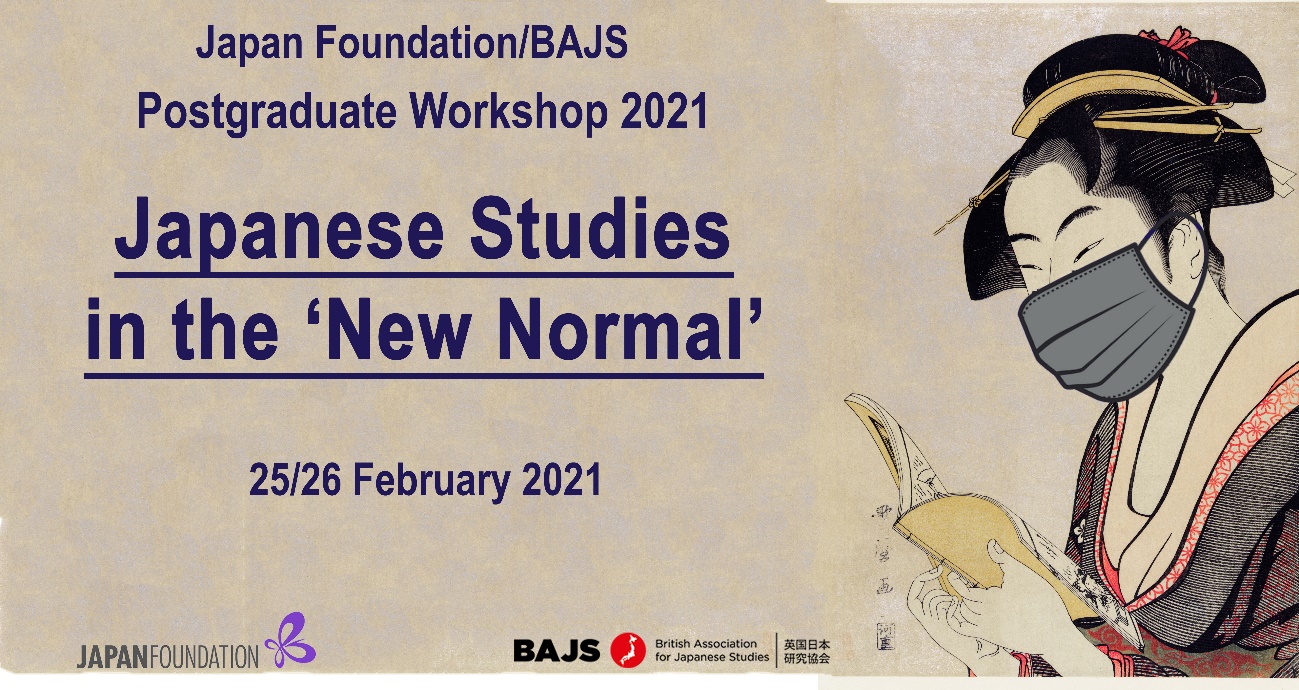
2021 marked the 10th anniversary of the Postgraduate workshop jointly organised by The Japan Foundation, London and the British Association for Japanese Studies. Over the course of two mornings, the workshop saw 38 students and 12 academics come together virtually to reflect on how COVID-19 has changed the Japanese Studies landscape.
Day one saw the students broken up into smaller groups to present their research to their peers and academics from similar research backgrounds. The range of topics currently being research offered a great insight into the broad interest of the next generation of Japanese Studies researchers. From early-stage MA students, to 5th year PhD students, everyone had a chance to present their research and receive feedback and advice from others in the room. We are very grateful to all of the researchers, who gave such insightful advice.
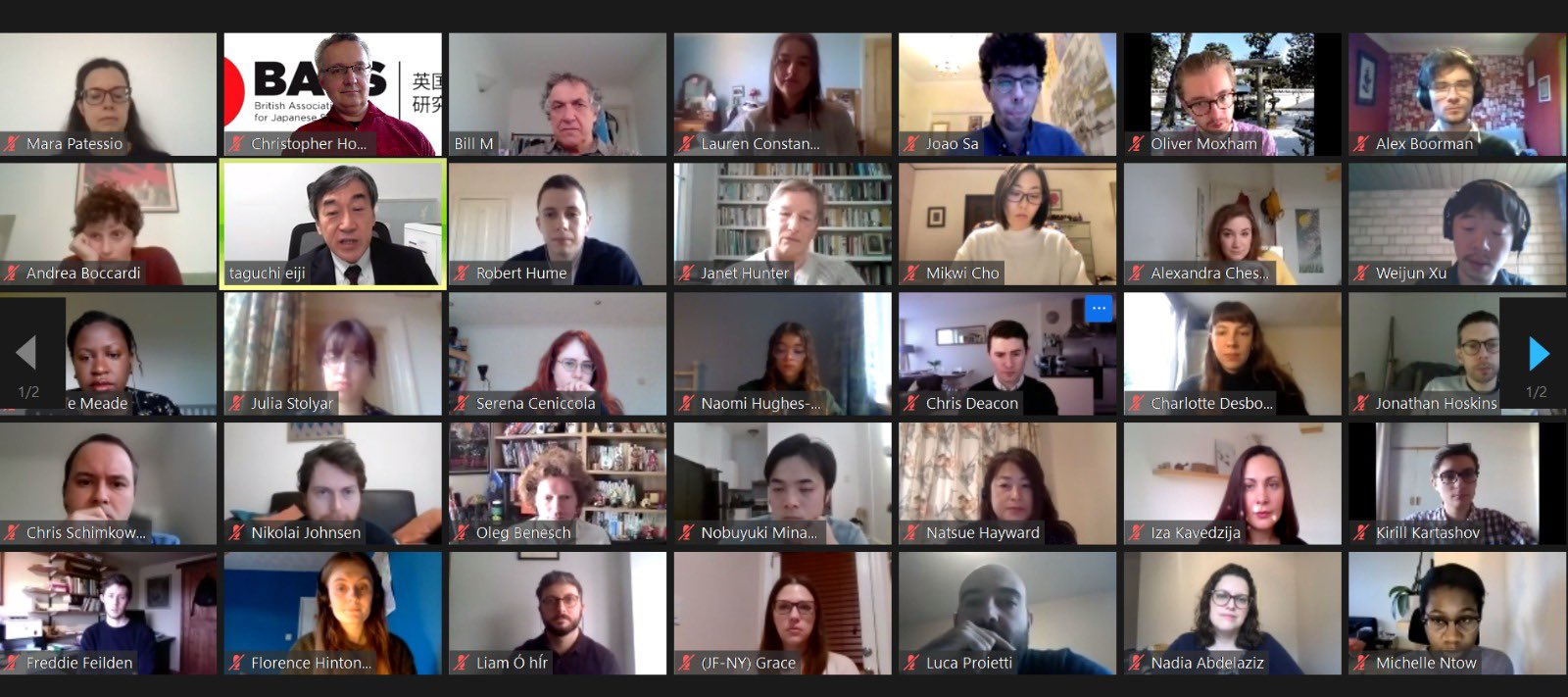
The second day we were joined by a variety of academics who took us through some of the key changes in the world of Japanese Studies. First, we were joined by Dr Victoria Young (University of Cambridge), who explained how life and the work environment has changed for teaching academics. She also gave invaluable advice on mental wellbeing and staying motivated in a virtual environment. She was followed by Dr Christopher Hood (Cardiff University), the President of BAJS, who talked students through the creation and functions of a blog about their research. He led a detailed discussion on how to build an online presence that will affect research profiles in a positive way.
The third session was led by Dr Hannah Osborne (University of East Anglia), the incoming editor of Japan Forum. Dr Osborne explained the process for journal submission and answered some important questions about getting research published. Thanks to this event taking place online we were able to hear directly from a Japan-based academic. We were joined by Prof KAWAMURA Kohei (Waseda University) who spoke positively about the academic situation in Japan, both in terms of international collaboration and career opportunities.
The final third of the programme started with Dr Christopher Hayes (SISJAC), who took us through his progress as an early career academic. Dr Hayes’ frank and upbeat talk was a fabulous end to the academic programme and provided many of the attendees with hope and a bright outlook for their own careers.
Finally, we were joined by the Embassy of Japan in the UK, The Japan Society for the Promotion of Science, the Daiwa Foundation, and the Great Britain Sasakawa Foundation. Each of these UK-based funding organisations took the attendees through the programmes they offer which could be of help.
The Japan Foundation, London would like to thank the British Association for Japanese Studies for all their efforts in organising this event as well as all of the academics for giving up their valuable time. We would also like to thank the funding organisations that spoke in the final session.
Next year, we hope to be able to return with a face-to-face event. Please keep an eye on our website for future details.
11/06/2020
The Hakuhodo Foundation is now accepting applications for the 16th Hakuhodo Foundation Japanese Research Fellowship.
With the goals of further strengthening the fundamentals of international research into Japan and deepening international understanding of Japan, the Hakuhodo Foundation Japanese Research Fellowship invites leading international researchers of the Japanese language, Japanese language education, Japanese literature and Japanese culture to Japan to conduct residential research.
Application period: June 1 - October 30, 2020
Fellowship period:
Long-term (1 year) and short term 6 month fellowships are available
For further details please visit the Hakuho Foundation’s website:
https://www.hakuhofoundation.or.jp/en/program/
16/03/2020
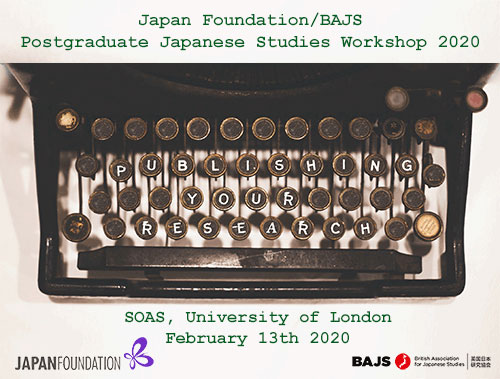
Once again The Japan Foundation and The British Association for Japanese Studies worked together on the 9th iteration of the Postgraduate Japanese Studies Workshop. Students from across various UK institutions came to SOAS, University of London for a day of workshops, presentations and networking. The aim of this year’s workshop was to give students help and advice on academic publishing.
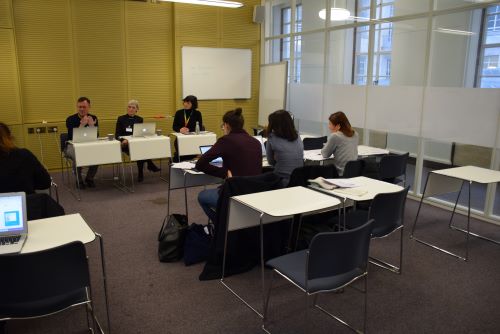
The first session was a hands-on feedback workshop, looking at work that students had submitted that they were hoping to turn into a publication in the future. Broken into smaller groups, they were helped by a panel of academics with a broad range of expertise and a wealth of experience in publishing their own works as journals, chapters and monographs.
Following a networking lunch, the students returned for session two, a Q&A session with the panel of assembled academics. The questions covered everything from politics sensitivities, to work-life balance in academia and with such a diverse panel from a wide range of disciplines and backgrounds, there was no shortage of interesting responses to each of the questions.
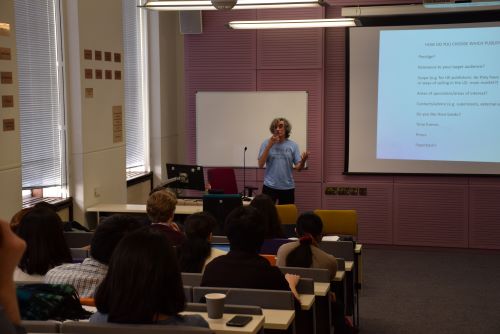
Session three saw Prof Ian Reader (The University of Manchester), take up the role of keynote speaker. A veteran of publishing with countless works to his name, Prof Reader aimed to guide students through the nuts and bolts of publishing a monograph, including how to select a publisher, the etiquette of submission and what to expect once you have submitted. Prof Reader was followed by Mr Laurence Green, the Managing Editor of Japan Forum. Mr Green gave important insider knowledge on the process of journal publishing and the work that goes into selecting which articles are published and what the submission process was like.
For the final session of the day, representatives from The Japanese Society for the Promotion of Science, The Embassy of Japan in the UK, and The Great Britain Sasakawa Foundation joined the organisers in discussing the funding opportunities that were available to students of Japanese Studies from their organisations. After the final session, a reception was held for all the attendees, academics and representatives to network and discuss the day’s workshop.
The Japan Foundation would like to thank the British Association for Japanese Studies for all their efforts in co-organising this event as well as the academics for giving up their valuable time. We would also like to thank all the funding institutions that spoke in the final session, Nikkei Europe and Kinokuniya Publication Services for displaying their services, and SOAS for hosting the event.
24/09/2019
The 10-day-long 2019 UCL Japan Youth Challenge summer school has come to a close. Jointly organised by the Japan Foundation and UCL, this year saw 52 students from 16 schools across Japan and 36 students from 29 schools around the UK come together to discuss some of the most important challenges facing the UK, Japan and the rest of the world. Throughout their time on the programme, the students also took lessons in each other’s languages to aid mutual understanding.
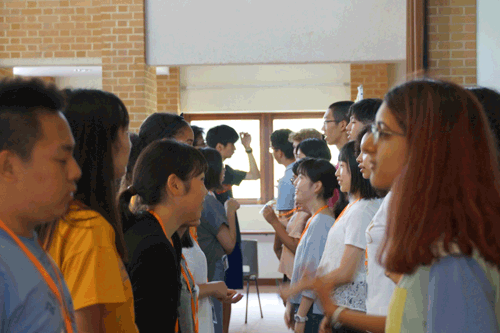
This year’s theme was Accessibility for All – Sports, AI and Robotics, with the students’ aim being to research, discuss and create innovative solutions to accessibility issues. After getting to know each other, the students heard from senior academics at both Cambridge and UCL to help give them some ideas surround this year’s theme.
The students used their new found inspiration and tackled the issues in small groups, each one deciding on an accessibility theme that they felt was important to them. The wide range of chosen topics included LGBT+ inclusion, visibility of para-sports, access to education and many others. The students discussed the issues and potential solutions at great length, creating a manifesto on how the issues should be approached by various bodies.
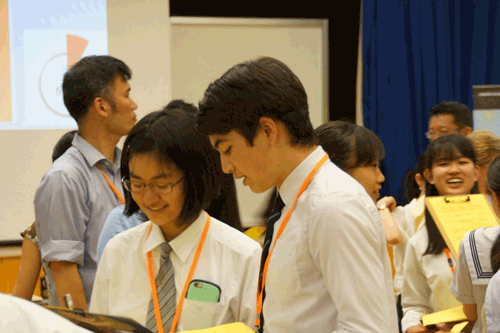
The UCL Youth Challenge culminated in the Grand Challenge Symposium. During this event, the students and members of the public were able to listen to a series of talks from researchers and practitioners, including former and current Paralympians, on their experiences surrounding accessibility. This symposium was also a fantastic chance for the students to present their own research on their chosen issues, with each group presenting to both the public and assembled speakers.
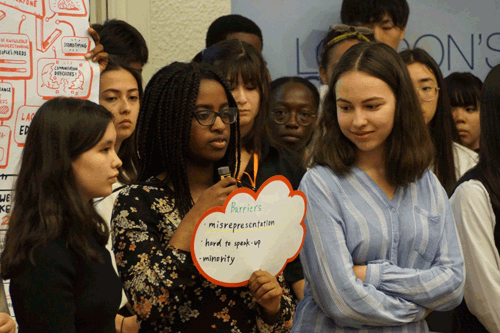
The Japan Foundation would like to thank our co-organisers, UCL, and all of the sponsors and volunteers who made this programme such a great success.
30/08/2019
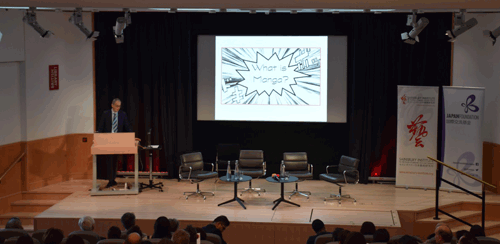
The Japan Foundation was proud to have teamed up with the Sainsbury Institute for the Study of Japanese Arts and Cultures (SISJAC), to organise the manga symposium, What is Manga? Exploring Japanese Visual Narratives. This event saw 16 speakers, come from Japan, Europe and North America to discuss the most important aspects of manga.
Chaired by SISJAC and UEA’s own Dr Eugenia Bogdanova-Kummer, the day’s opening keynote speaker was Prof Jaqueline Berndt from Stockholm University. Her lively and engrossing talk on manga studies as a multidisciplinary area gave a fantastic insight into manga’s emerging genres, audiences, and its place in the academic world.
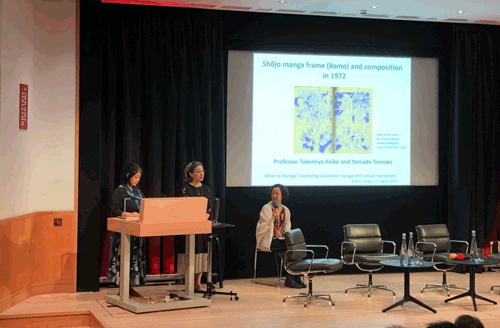
Prof Takemiya Keiko and Tomoko Yamada
The day continued with Panel 1. Various scholars provided an insight into manga theory and manga iconography. Professors Ito Go and Natsume Fusanosuke gave a live drawing session, showing the importance of specific icons and lines within manga and demonstrating how a single line can change an entire story. This was followed by Tomoko Yamada and Prof Keiko Takemiya’s on stage discussion of Shojo (girls’) manga – drawing a particular focus on the early pioneers of shojo manga (of which Prof Takemiya was one) and their artistic styles. The final speaker was Prof Yoshimura Kazuma, who provided information on manga literacy and the ways in which people learn to read manga effectively from a young age, also touching on manga designed for those with learning difficulties. The panel was kindly wrapped up by Prof Toshio Watanabe, who provided the audience with much to think about.
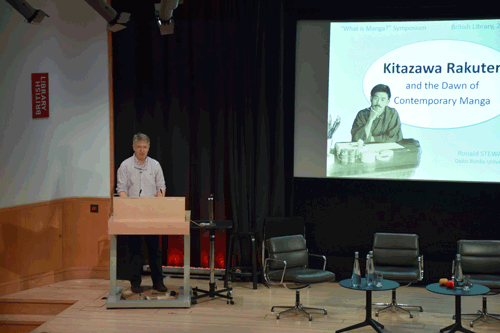
Prof Ronald Stewart discussing the life of Kitzawa Rakuten
Panel 2 saw a shift in focus onto manga’s history and its development to the modern day, with Dr Ryoko Matsuba going back to the very early roots of manga and linking it to what we now call manga. Prof Ronald Stewart then explored the life and works of Kitazawa Rakuten, known by some as the first professional manga artist. He also highlighted some of the non-Japanese influences on early manga. The panel was neatly and enthusiastically summed up by Prof Adam Kern, asking the audience to reflect on the internationality and interconnectedness of comics.
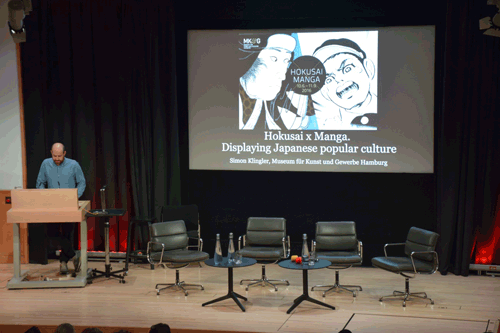
Simon Klingler discussing his work on Hokusai x Manga
The final panel of the day look at manga in museums. First two members of Kyoto Seika University and Kyoto International Manga Museum, Ito Yuu and Yoo Suukyung spoke on the planning of manga exhibitions in Japan and drawing in audiences, later discussing the behind the scenes work and difficulty of archiving original manga drawings. Simon Klingler from Museum für Kunst und Gewerbe, spoke on his experiences as the curator of the Hokusai x Manga exhibition at his museum and the processes involved in making it a success. Finally, Prof Nicole Rousmaniere, curator of the hugely successful British Museum’s manga exhibition, spoke about her journey through curating the exhibition and the challenges and thoughts behind the exhibit. This panel was neatly wrapped by Dr Ian Hague.
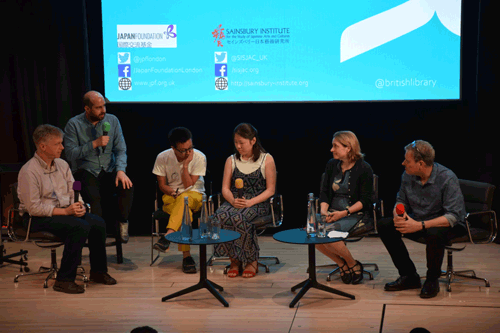
From left to right: Prof Ronald Stewart, Simon Klinger, Ito Yu, Yuu Sookyung, Prof Nicole Rousmaniere, Dr Roger Sabin – taking part in the final round table discussion.
A round table was held at the end of the day with each of the speakers invited to discuss various topics surrounding manga. Alongside audience questions, Prof Roger Sabin of UAL acted as chair of the discussion, guiding the speakers onto the key topics of the day.
The Japan Foundation would like to thank all of the speakers, our co-organisers SISJAC, The British Library for hosting the event, and the British Museum and Prof Nicole Rousmaniere for their initiative in creating this symposium. We would also like to thank all of the audience members who came to learn more about the fascinating subject of manga.
13/06/2019

The Hakuho Foundation is now accepting applications for the 15th Hakuho Foundation Japanese Research Fellowship.
With the goals of further strengthening the fundamentals of international research into Japan and deepening international understanding of Japan, the Hakuho Foundation Japanese Research Fellowship invites leading international researchers of the Japanese language, Japanese language education, Japanese literature and Japanese culture to Japan to conduct residential research.
Application period: June 3 - October 31, 2019
Fellowship period:
Long-term (1 year): September 1, 2020 - August 31, 2021
Short-term (6 months): September 1, 2020 - February 28, 2021 (Round 1), or March 1 - August 31, 2021(Round 2)
For further details please visit the Hakuho Foundation’s website:
https://www.hakuhofoundation.or.jp/en/program/
25/09/2018
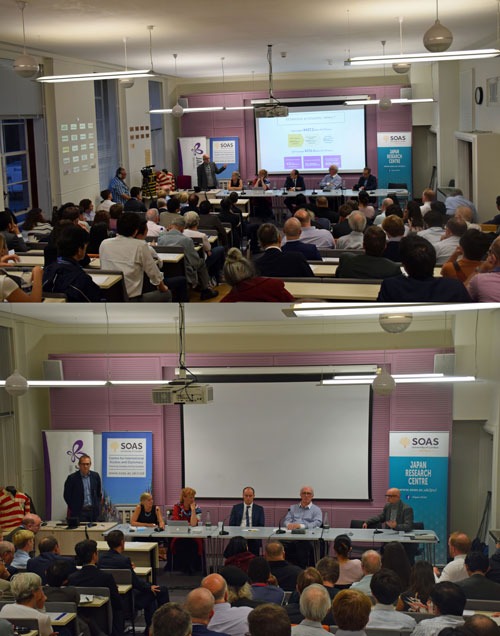 September 20th 2018 marked exactly one year to go before the Rugby World Cup kicks off in Japan. To mark this event, the Japan Foundation and SOAS held a symposium on the topics of rugby in Japan and sporting mega-events themselves. This event was the third in its series and the speakers presented to an excited full house at the SOAS Alumni Lecture Theatre.
September 20th 2018 marked exactly one year to go before the Rugby World Cup kicks off in Japan. To mark this event, the Japan Foundation and SOAS held a symposium on the topics of rugby in Japan and sporting mega-events themselves. This event was the third in its series and the speakers presented to an excited full house at the SOAS Alumni Lecture Theatre.
Our first speakers, offering a joint presentation on the history of rugby in Japan until the outbreak of World War Two, were Phil McGowan (World Rugby Museum) and Mike Galbraith (De Montford University). Their talks gave great insights into how rugby came to Japan and how it blossomed into a fully-fledged sport whilst showcasing their work into tracing Japanese rugby back to its earliest game.
This was followed by Helen Macnaughtan's (SOAS) wonderful talk about how rugby flourished with the help of with the help of heavy industry companies following World War Two. Finally Bringing us right up to the present day and the current state of rugby in Japan and the national and local teams.
The third speaker, Hilary Frank (Cornwall Council), gave us a series of personal insights into her work at the 1998 Nagano Winter Olympics, the 2002 Korea-Japan FIFA World Cup, and the 2019 Rugby World Cup. This personal approach gave the audience a chance to hear a side of the story that is rarely told.
Our final speaker was Simon Chadwick (Salford University), who was able to show the economic side of these mega-events and offer a balanced and animated talk on the benefits and losses associated with hosting them. The talks were finished off with a Q&A session hosted by J. Simon Rofe (SOAS), with the audience providing some challenging questions for the speakers.
Finally, to cap the evening off, there was a reception hosted by Sake Samurai, featuring two sommeliers on hand to offer tastings and give advice on sake. This gave the audience a chance to informally speak to the speakers and organisers, and to chat to each other about the evening.
A full video of the event can be found on the SOAS Youtube page
26/02/2018
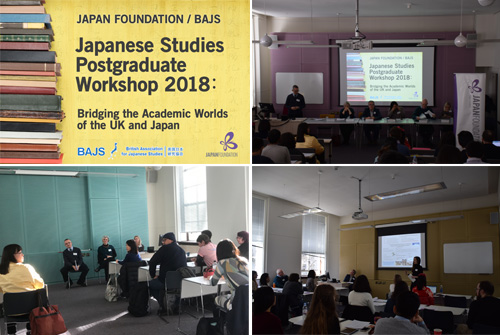
This February 16 2018 saw the return of the annual Japanese Studies postgraduate workshop, the seventh jointly hosted by the Japan Foundation London and the British Association for Japanese Studies (BAJS). Held at SOAS University of London and attended by 36 postgraduate students from 22 different UK universities working on Japan related research in diverse disciplines across the humanities and social sciences, the workshop was a great opportunity for these emerging researchers to receive practical advice on their research from senior academics, and to network with fellow postgraduate students.
The year’s theme focused on how emerging academics in the UK can help to bridge the academic worlds of the UK and Japan through their research.
Each of the 36 student participants were given the opportunity to make a five minute presentation on their Japan related research and why they believe it is important for the advancement of Japanese Studies in the UK and Japan in front of an audience of peers and senior academics. This was followed by lively group discussion sessions on how to make your research relevant to a wider audience in Japan and the UK.
The afternoon saw a series of talks by leading figures from UK Japanese Studies taking on key challenges relating to conducting and disseminating research in Japan. Topics tackled included ‘Challenges of short fieldwork trips’ (BAJS president Dr Christopher Hood, University of Cardiff); ‘Ethical issues when doing fieldwork in Japan’ (Dr Erica Baffelli, University of Manchester); ‘Postdoctoral career development in Japan and the UK’ (Dr Peter Matanle, University of Sheffield); ‘Your role as a foreign researcher/academic in Japan’ (Prof Robert Aspinall, Doshisha University) and ‘Publishing in Japan’ (Dr Aya Homei, University of Manchester).
The next session welcomed Prof Takehiko Kariya from the University of Oxford who provided a fascinating view from a Japanese scholar and sociologist on the different communities of Japanese Studies in the UK and the Social Sciences disciplines in Japan, and what emerging researchers in the UK can do to help bridge the gap between them.
The workshop finished with a session on ‘Funding to continue your career in Japan and the UK’ with presentations from representatives of the Daiwa Anglo-Japanese Foundation, Embassy of Japan in the UK, Great Britain Sasakawa Foundation, Japan Society for the Promotion of Science, British Association for Japanese Studies and the Japan Foundation London introducing the wide range of potential sources of funding for Japanese Studies including funding to support research in Japan.
Participants and speakers took to twitter to enthusiastically express their feedback on the workshop using the hashtag #JapanPostGrad
Some comments from student participants include:
‘The workshop this time was the best among previous ones. I like the way the workshop is evolving each time. The aspects of what to expect in Japanese academia were very useful. I also enjoyed the morning session which allowed me to improve my presentation skills.’
‘It [The workshop] was very inspiring and undoubtedly useful – I'm still digesting all the stimuli that we received.’
Thank you very much to all participants and speakers for making the event such a great success. We hope to see you again at a future workshop! If you are a PhD student undertaking research on Japan and are interested in attending a similar event in future, please get in touch!
21/06/2017

The Hakuho Foundation is now accepting applications for the 13th Hakuho Foundation Japanese Research Fellowship.
With the goals of further strengthening the fundamentals of international research into Japan and deepening international understanding of Japan, the Hakuho Foundation Japanese Research Fellowship invites leading international researchers of the Japanese language, Japanese language education, Japanese literature and Japanese culture to Japan to conduct residential research.
Application period: June 9-October 31, 2017
Fellowship period: September 1, 2018-August 31, 2019 (6 months or 12 months)
For further details, please visit the Hakuho Foundation’s website:
http://www.hakuhofoundation.or.jp/english/program/tabid/196/Default.aspx
28/03/2017
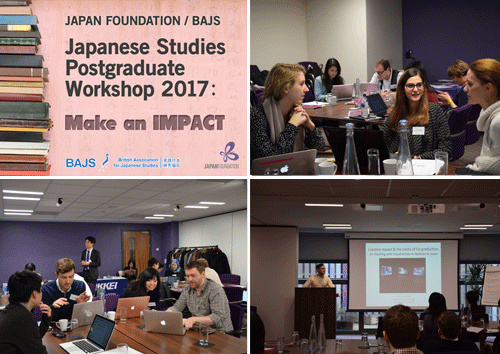
February 24 2017 saw the return of the annual Japanese Studies postgraduate workshop, the sixth the Japan Foundation has held in co-operation with the British Association for Japanese Studies (BAJS), and the second to be held outside London. This year’s workshop held at the University of Sheffield, was attended by 36 postgraduate students from 18 different universities in the UK and Europe working on Japan related research in diverse disciplines across the humanities and social sciences.
The theme of this year’s workshop focused on how emerging academics can expand the impact of their research on wider academia and society outside the Japanese Studies community.
The workshop opened with a series of inspiring case studies from senior academics at the University of Sheffield’s School of East Asian Studies. Prof Hugo Dobson, Dr Mark Pendleton and Dr Peter Matanle discussed their own experiences of conceiving, generating and recording the impact of their research covering diverse perspectives from international relations and ‘translating’ research for the media, working with policy-makers, to creative collaboration with visual artists.
The presentations were followed by a series of hands-on workshop sessions led by Dr Thomas McAuley, Lecturer in Japanese Studies at the University of Sheffield, during which students worked in small groups to define their research for an audience of non-specialists, and to put together a statement on the potential impact and audience for their research.
The workshop finished with a session on ‘Funding your Research’ with presentations from representatives of the Great Britain Sasakawa Foundation, Daiwa Anglo-Japanese Foundation, Japan Society for the Promotion of Science, British Association for Japanese Studies and the Japan Foundation introducing the wide range of funding programmes available to emerging researchers in Japanese Studies.
Some comments from student participants include:
‘I have heard suggestions on how to expand my research and enhance its impact in ways that I hadn’t even considered before.’
‘The research impact workshop was brilliantly designed – extremely useful and practical. One of the best events I have attended during the three years of my PhD.’
Thank you very much to the British Association for Japanese Studies, the University of Sheffield and all participants and speakers for making the workshop such a great success. We hope to see you again next year! If you are a PhD student undertaking research on Japan and would like to attend a future workshop, please do get in touch!
01/12/2016
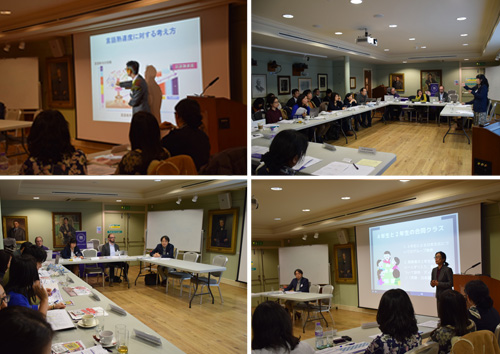 On Saturday 5th November the Japan Foundation London held the first Japan Year Abroad Programme (J-YAP) Coordinator Conference at the Royal Asiatic Society in London. As the inaugural meeting of the new J-YAP Coordinators Network, the conference was the first opportunity for staff members involved in the administration of Year Abroad Programmes within Japanese/Japanese Studies degree courses at universities across the UK to gather to share information on how to combat common administration challenges and help enable students make the most of their unique Year Abroad programme opportunities. Participating in the discussions were 14 Year Abroad Programme Coordinators and related staff members from 11 universities which offer Japanese/Japanese studies degree courses, and members of the British Association for Japanese Studies and other key Japanese Studies related organisations.
On Saturday 5th November the Japan Foundation London held the first Japan Year Abroad Programme (J-YAP) Coordinator Conference at the Royal Asiatic Society in London. As the inaugural meeting of the new J-YAP Coordinators Network, the conference was the first opportunity for staff members involved in the administration of Year Abroad Programmes within Japanese/Japanese Studies degree courses at universities across the UK to gather to share information on how to combat common administration challenges and help enable students make the most of their unique Year Abroad programme opportunities. Participating in the discussions were 14 Year Abroad Programme Coordinators and related staff members from 11 universities which offer Japanese/Japanese studies degree courses, and members of the British Association for Japanese Studies and other key Japanese Studies related organisations.
The conference was divided into three themed sections led mainly by current Year Abroad Programme Coordinators.
The first session opened with a lively discussion on ways to utilise returning 4th year students as resources to deliver student guidance and support before and during the Year Abroad and therefore lighten the workload of J-YAP administrators, focusing on two case studies of innovative strategies put in place by UK universities.
Session 2 addressed challenges experienced by universities when sending students with diverse needs to Japan, such as negotiation with Japanese partner universities and student placement. Current Year Abroad Programme coordinators introduced their own experiences and led a discussion during which participants shared and developed practical and collaborative strategies to deal with these challenges. During this session, The Japan Foundation’s own Chief Language Advisor Makoto Netsu also introduced the JF Standard (Japanese site/English pamphlet) as an objective measure which can be used to standardise the evaluation of student’s Japanese language proficiency before and after the Year Abroad so that students can continue their language study in Japan building on their previous achievements at their home university.
The third and final session examined ways to help students make the most of the unique opportunities during the Year Abroad to help prepare for further studies on return to the UK and their future career beyond graduation. Dr Chris Perkins (British Association for Japanese Studies) explored how to integrate preparations for the fourth year dissertation not only into the Year Abroad itself, but also into the full four year degree programme as a whole. Ms Kiko Hill (Disco International Ltd.) introduced ways that students can use their time during the Year Abroad to prepare themselves for careers in Japan or Japanese companies.
Some of the feedback from participants included:
“A wonderful initiative that has the potential to have a big impact on Year Abroad coordination”
「貴重な機会をありがとうございました。15年前にあったら私の人生ももっと楽だった…」
(“Thank you for this valuable opportunity. If this conference existed 15 years ago my life would have been a lot easier...”)
Following the conference the Japan Foundation has set up the Japan Year Abroad Programme (J-YAP) Network JiscMail Mailing List as a platform for university staff members to continue to share information and ideas relating to Japan Year Abroad Programmes to help each other combat common challenges and strengthen and promote Year Abroad programmes. If you are involved in administrating a Year Abroad Programme within a Japanese/Japanese Studies degree course and would be interested in joining this network please do get in touch with the Japan Foundation by emailing: j-yap-request@jiscmail.ac.uk
Thank you to all participants and speakers for making the J-YAP Coordinator Conference such a great success and we look forward to future J-YAP network activities!
12/07/2016

The Hakuho Foundation is now accepting applications for the 12th Hakuho Foundation Japanese Research Fellowship.
With the goals of further strengthening the fundamentals of international research into Japan and deepening international understanding of Japan, the Hakuho Foundation Japanese Research Fellowship invites leading international researchers of the Japanese language, Japanese language education, Japanese literature and Japanese culture to Japan to conduct residential research.
Application period: June 10-October 31, 2016
Research period: September 1, 2017-August 31, 2018 (6 months or 12 months)
For further details, please visit the Hakuho Foundation’s website:
http://www.hakuhofoundation.or.jp/english/program/tabid/196/Default.aspx
18/05/2016

To mark the 100th anniversary of the death of Natsume Soseki (1867-1916), the Asahi Shimbun Co., in co-operation with the Japan Foundation, Iwanami Shoten Publishers and Ferris University, is inviting entries for an international essay contest on the continuing appeal of the influential Japanese author’s works among foreigners.
Soseki, one of Japan's most famed and popular authors, lived in Japan’s period of transition to a modern society. His works have been extensively translated overseas and his representative work, “Kokoro” (Heart), has been translated into more than 20 languages.
Content of Essay: Participants are required to write essays in Japanese about Soseki’s appeal, which remains strong even today. The theme of the competition is “Soseki and I”, and essays submitted should include the circumstances about when the participant read Soseki’s work for the first time (title of the work, when, where, in what language and why). Essays must be 2,000 Japanese characters or less.
Eligibility: Entries for the essay competition will be accepted from those living overseas or in Japan whose native language is not Japanese. For those residing in Japan, their stay in the country must be less than two years. International students studying in Japan are also eligible to participate.
Prizes: Three winners (including one first prize winner, and two runners up) will be invited to attend a symposium on Natsume Soseki which will be held at the Yurakucho Asahi Hall in Tokyo on 10th December 2016.
Deadline for entries : Applications are now open and will close on 10 August 2016.
For further information including details on how to apply, please visit: http://www.asahi.com/shimbun/sosekiessaye.html
Good luck to everyone taking part!
Note: The Japan Foundation is not responsible for receiving applications
10/05/2016
 February 4th 2016 saw the return of our annual Post-Graduate Workshop, the fifth organised by the Japan Foundation in collaboration with the British Association for Japanese Studies (BAJS). This year’s workshop, hosted at the Holiday Inn Bloomsbury in London, was attended by a full house of 40 postgraduate students in Japan related fields representing a record number of 22 universities across the UK. The workshop was a great opportunity for these emerging researchers to receive practical advice on their research from senior academics, and to network with fellow postgraduate students.
February 4th 2016 saw the return of our annual Post-Graduate Workshop, the fifth organised by the Japan Foundation in collaboration with the British Association for Japanese Studies (BAJS). This year’s workshop, hosted at the Holiday Inn Bloomsbury in London, was attended by a full house of 40 postgraduate students in Japan related fields representing a record number of 22 universities across the UK. The workshop was a great opportunity for these emerging researchers to receive practical advice on their research from senior academics, and to network with fellow postgraduate students.
During the day four PhD students presented their research and received constructive comments and questions from fellow-postgraduate students and senior academics in discussion sessions chaired by BAJS President Professor Caroline Rose. The four presentations were chosen from a number of excellent and diverse proposals, and covered topics ranging from disaster mental health in Japan (Ben Epstein, UCL), technology and Japan in the British press (Christopher Hayes, Cardiff University), ‘Expressive’ women and Western attire in Japanese cinema (Lois Barnett, SOAS, University of London), and child guidance centres in Japan (Michael King, University of Oxford).
The workshop also featured several practical sessions by BAJS committee members and senior academics who provided practical advice on real problems affecting emerging Japanese studies researchers. Dr Susan Townsend (University of Nottingham) gave some excellent advice on carving academic and career opportunities outside ‘East Asian studies’ departments, drawing from her own experience as a Japan specialist working in the Department of History at the University of Nottingham. Later in the afternoon, to tackle some of the challenges faced by students using Japanese language in their research careers, Dr Thomas McAuley (University of Sheffield) and Dr Luli van der Does-Ishikawa teamed up to lead a very enjoyable and practical session which explored how to use social media to promote your research and raise your profile in Japanese academia using Japanese language.
Responding to feedback received during last year’s event which identified securing postdoctoral positions as a key challenge for emerging researchers, this year’s workshop introduced a panel session featuring three early career researchers and lecturers in Japanese studies who were able to offer career advice from recent experience. Dr Jonathan Service (University of Oxford), Dr Gitte Marianne Hansen (Newcastle University) and Dr Ruselle Meade (Cardiff University) each introduced their individual career paths, and then took questions from the audience in an interactive panel discussion. Dr Hansen and Dr Meade had participated in our very first post-graduate workshop as PhD students in 2012, and it was inspiring to have them participate four years later as established lecturers!
Early Career Development Panel Discussion:
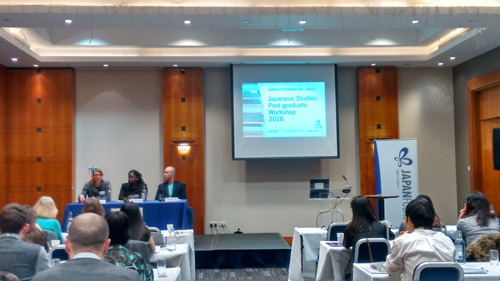
The workshop finished with a session on ‘Funding your Research’ with presentations from Susan Meehan (Daiwa Anglo-Japanese Foundation), Chigusa Ogaya (Japan Society for the Promotion of Science), Rory Steele (Great Britain Sasakawa Foundation), and Julie Anne Robb (Japan Foundation) introducing the wide range of funding programmes available to researchers in Japanese Studies.
All sections received great feedback with one participant commenting that they ‘really enjoyed the positive, constructive and non-combative atmosphere’, and another noting that ‘all aspects of the event offered valuable insights from the PhD presentations, through to the funding options to career considerations’. Another participant commented that ‘I have just started my PhD, and I thought this workshop would help me to familiarise myself with the opportunities of funding open to PhD candidates in Japanese Studies in the UK. Moreover, I wanted to attend the workshop to listen to the presentations, which I found deeply inspiring!’
The event was followed by a networking dinner reception, generously funded by BAJS.
Thank you to all participants and speakers for making the workshop such a great success. We hope to see you again next year!
29/09/2015
The application forms for the Japanese Studies Fellowship Programme 2016 have now been released on our Tokyo website here.
This programme provides opportunities to outstanding scholars in Japanese Studies who wish to conduct research in Japan. It is split into three categories: Long-Term Scholars and Researchers, Short-Term Scholars and Researchers, and Doctoral Candidates.
To learn more about the programme contact Julie Anne Robb or visit the programme list on our Tokyo site.
Application deadline: 1st December, 2015
Please discuss your eligibility with the Japan Foundation before applying.
News Archive
Perspectives Newsletters Archive
| Click here for old issues of the Japan Foundation London newsletter, Perspectives. |



 Japanese Studies & International Dialogue Navigation
Japanese Studies & International Dialogue Navigation